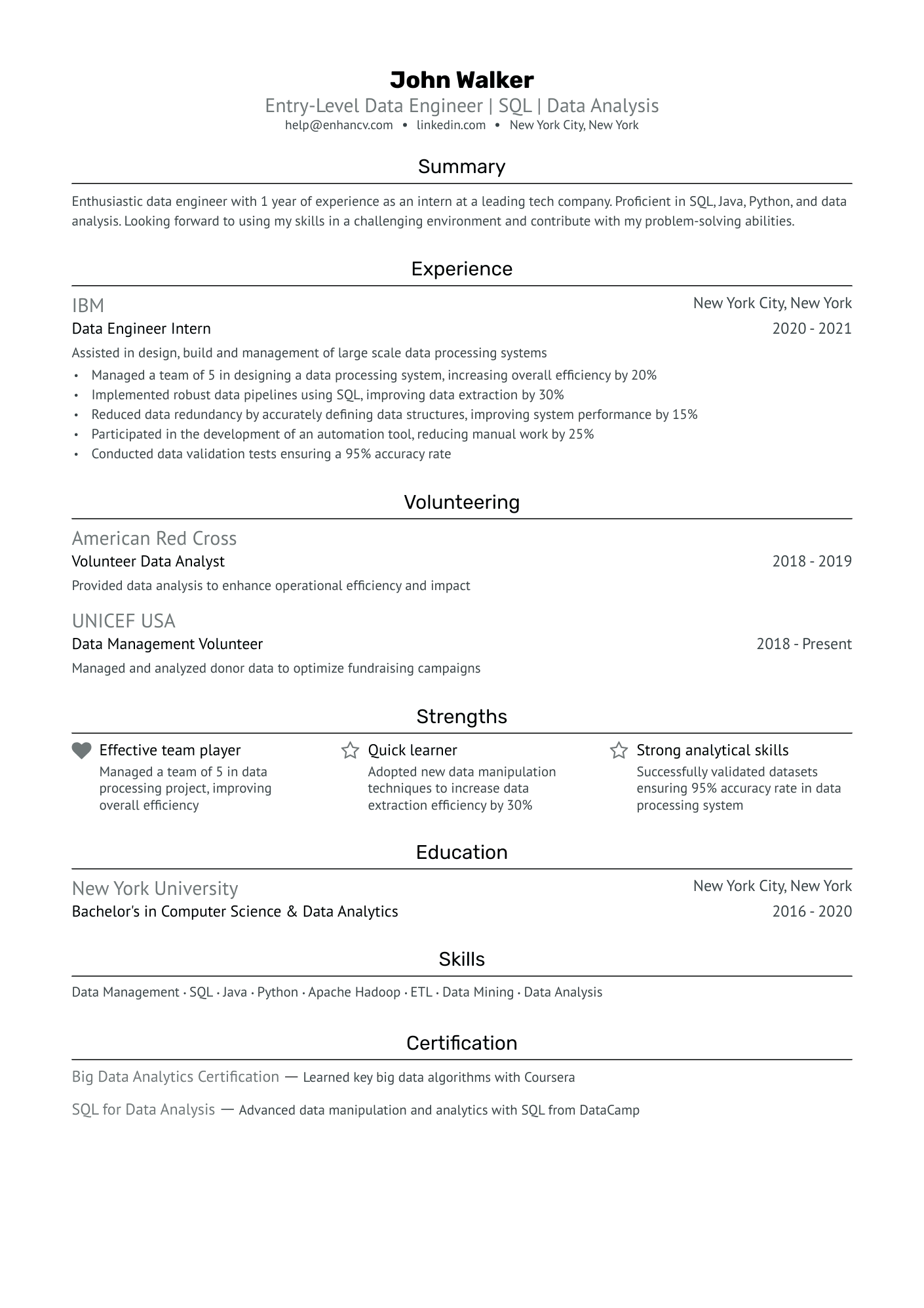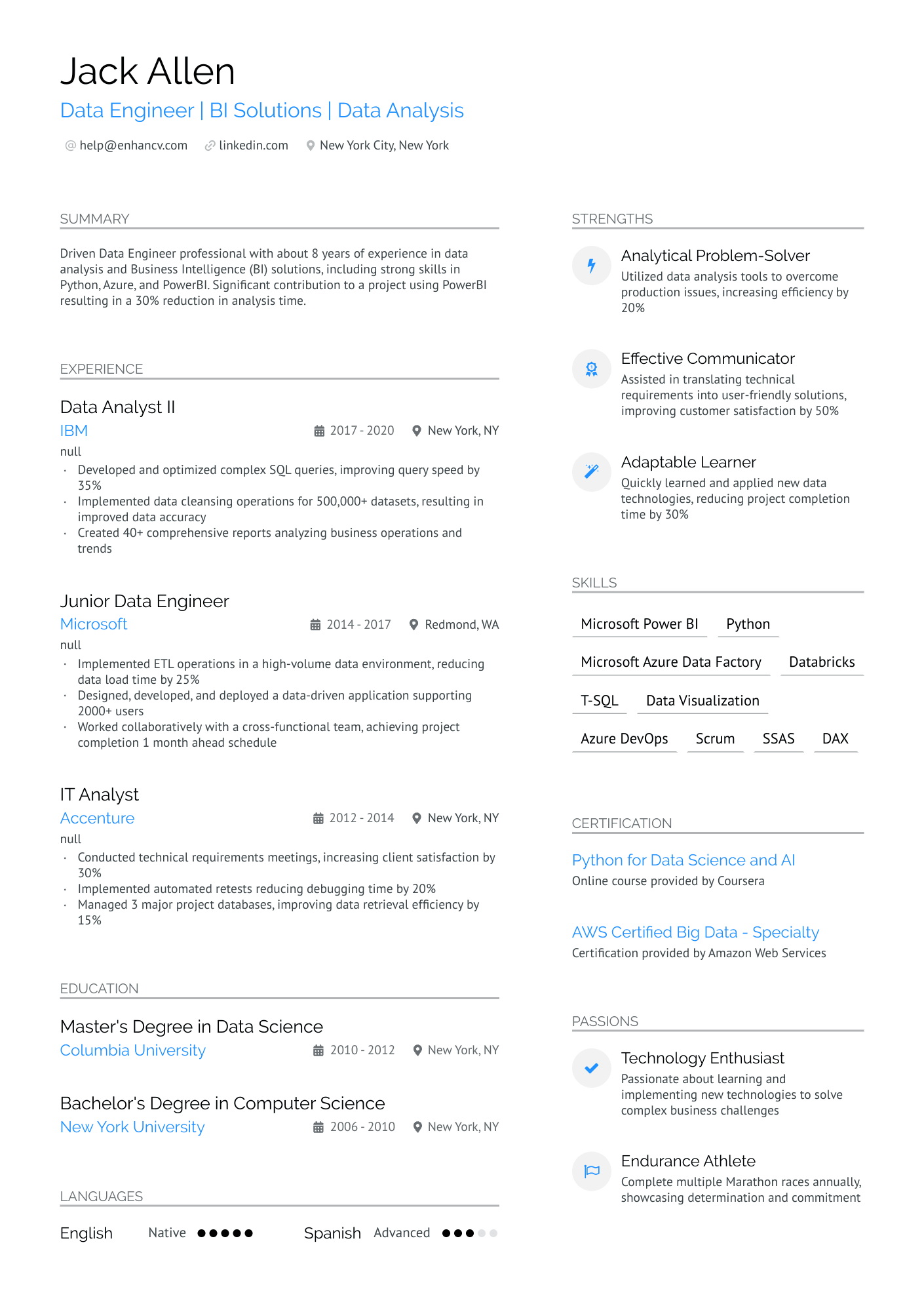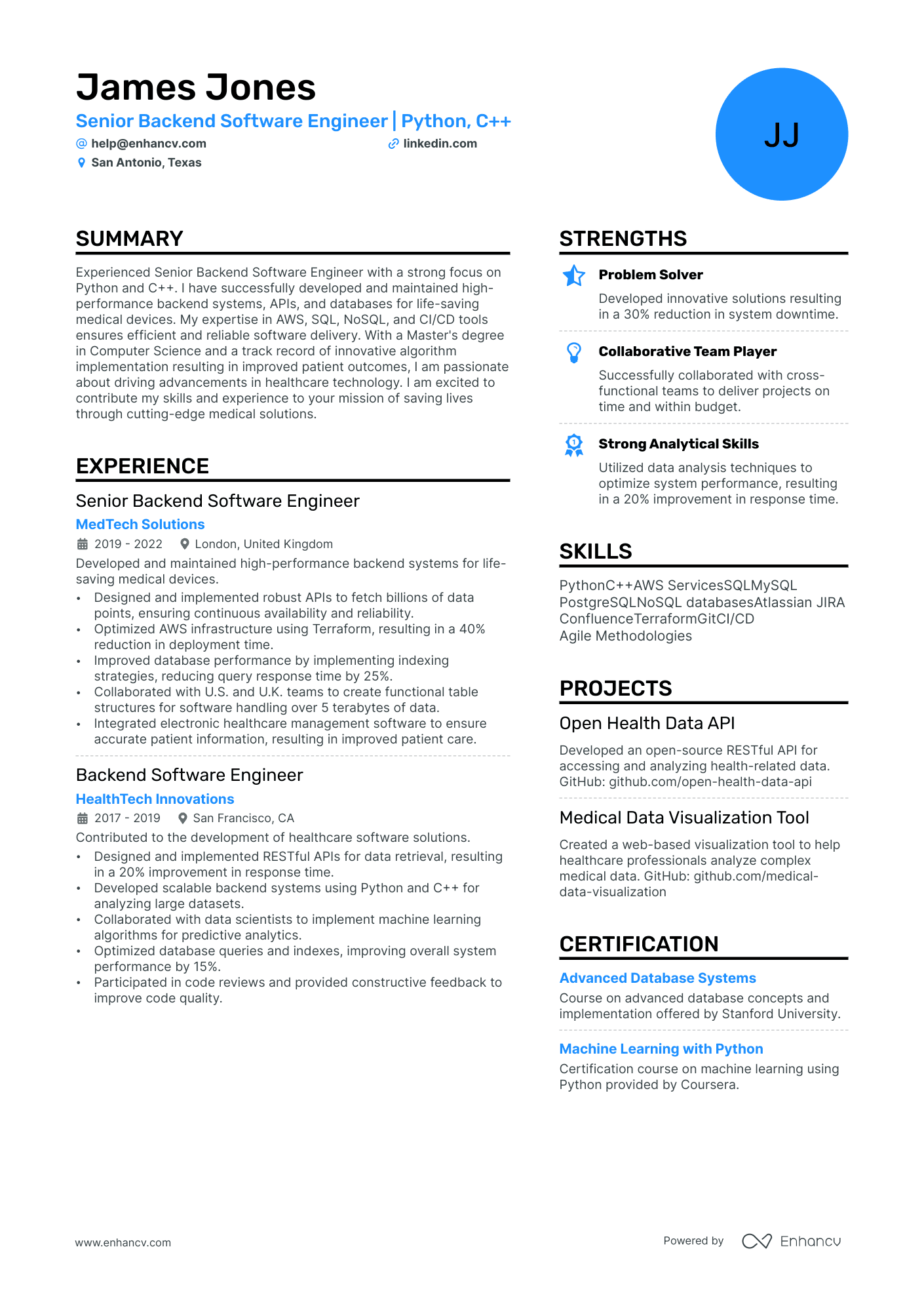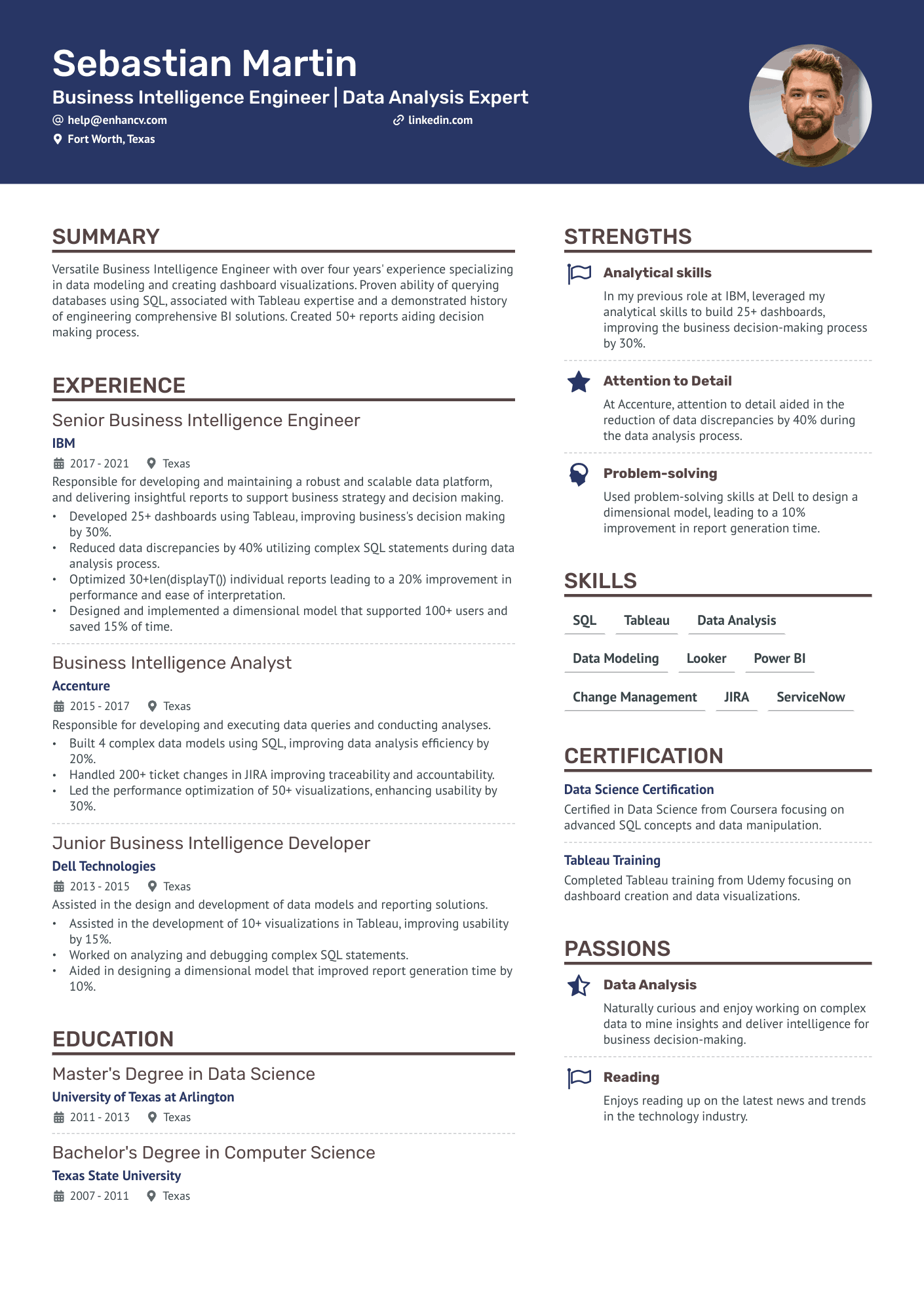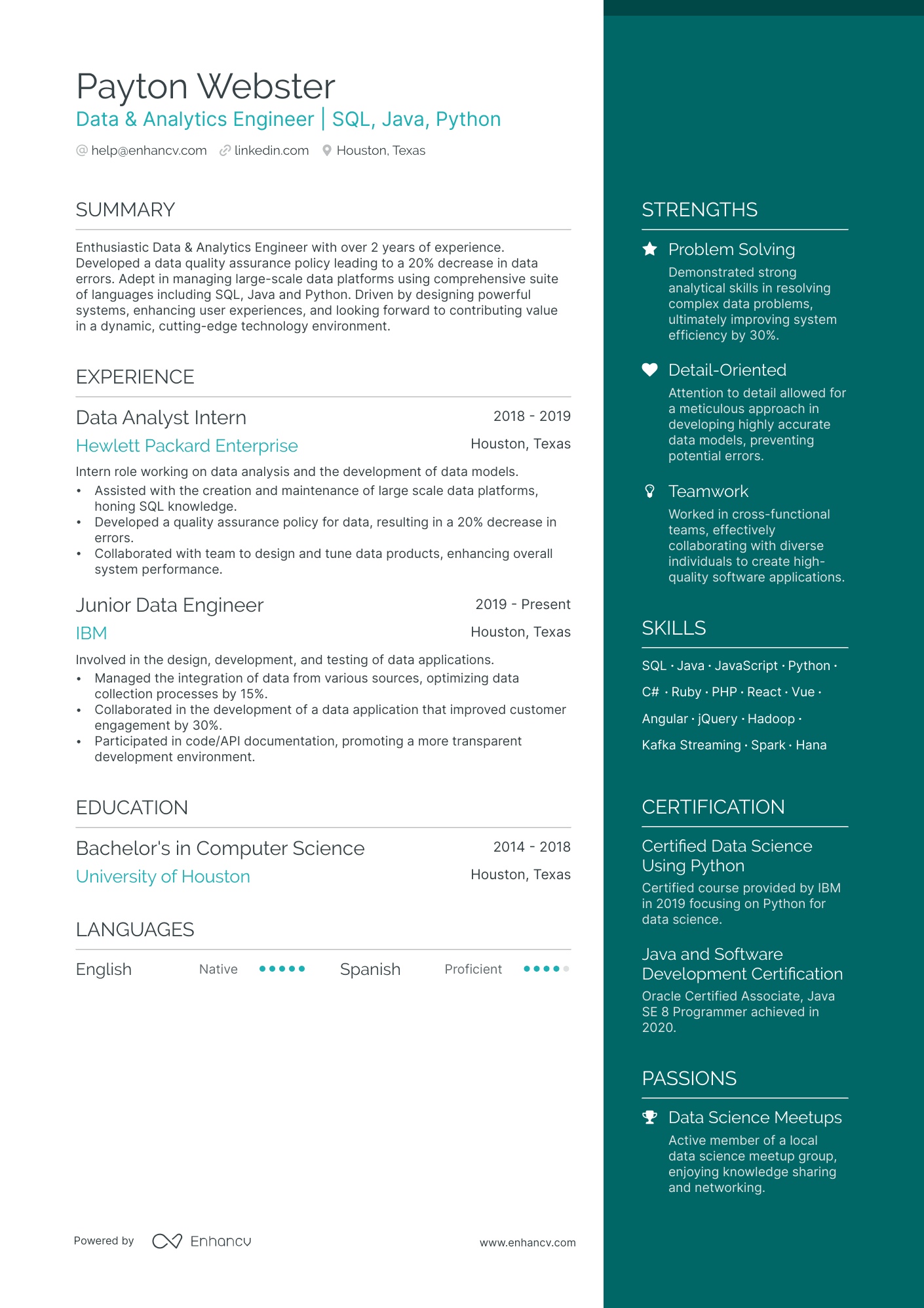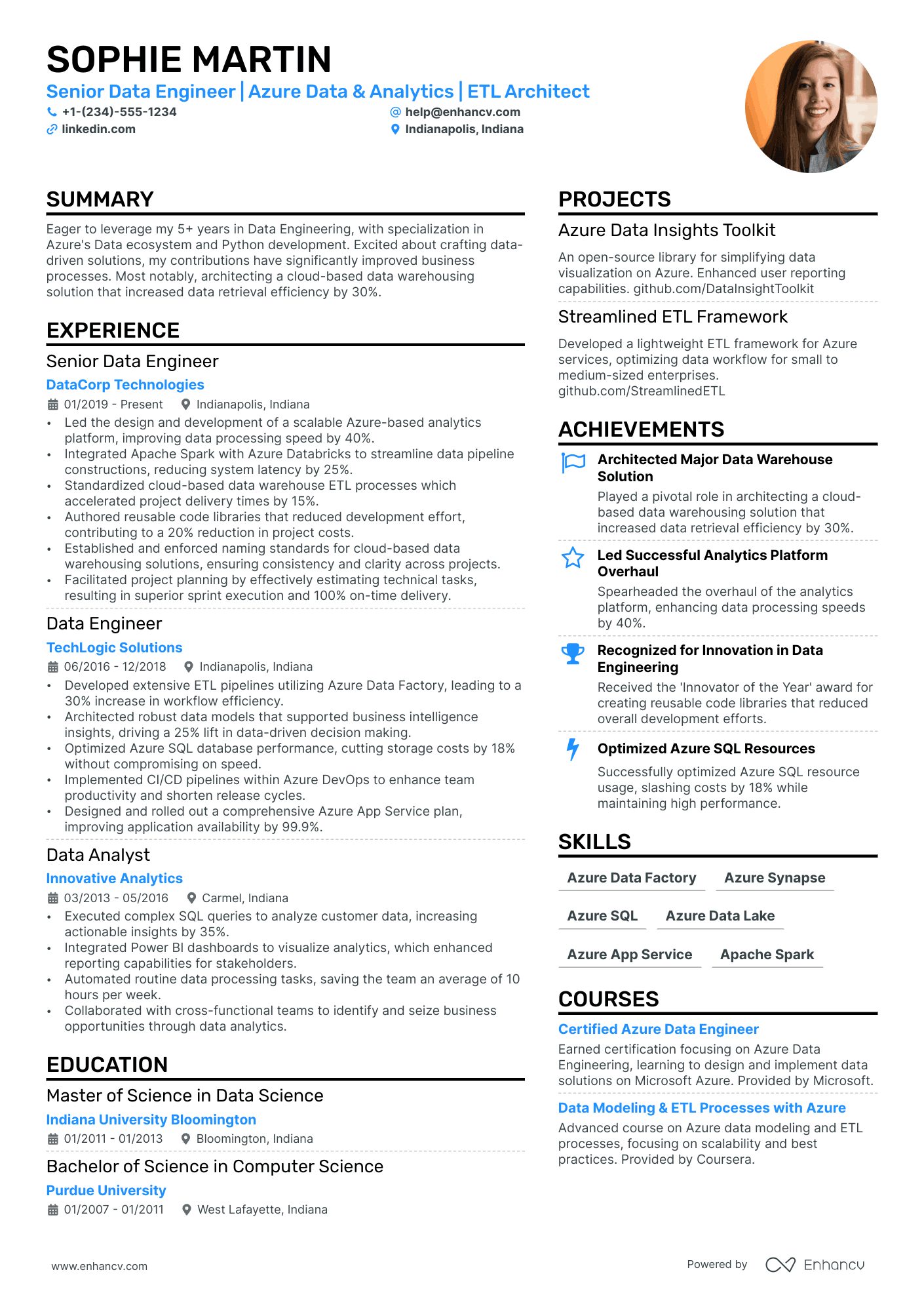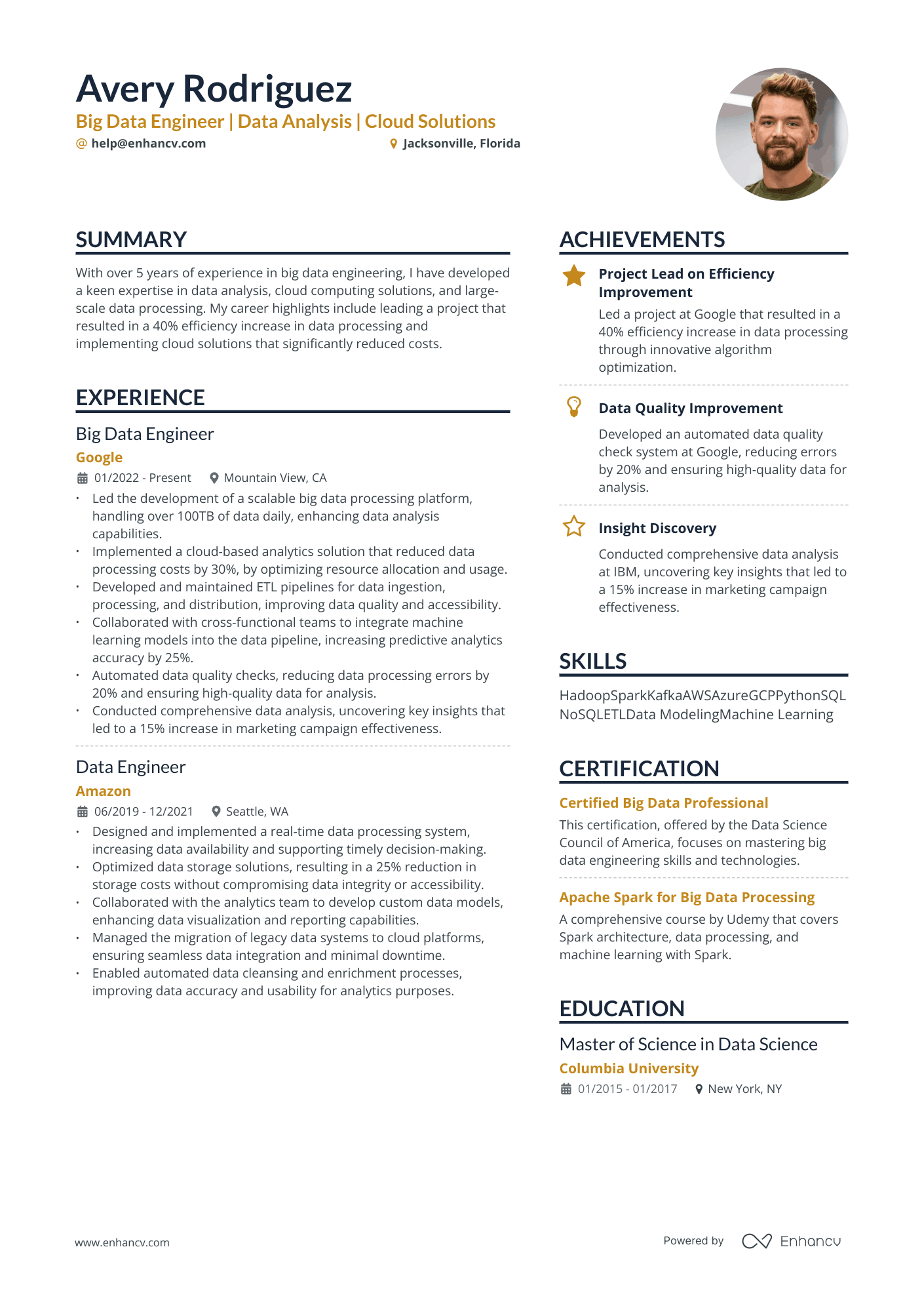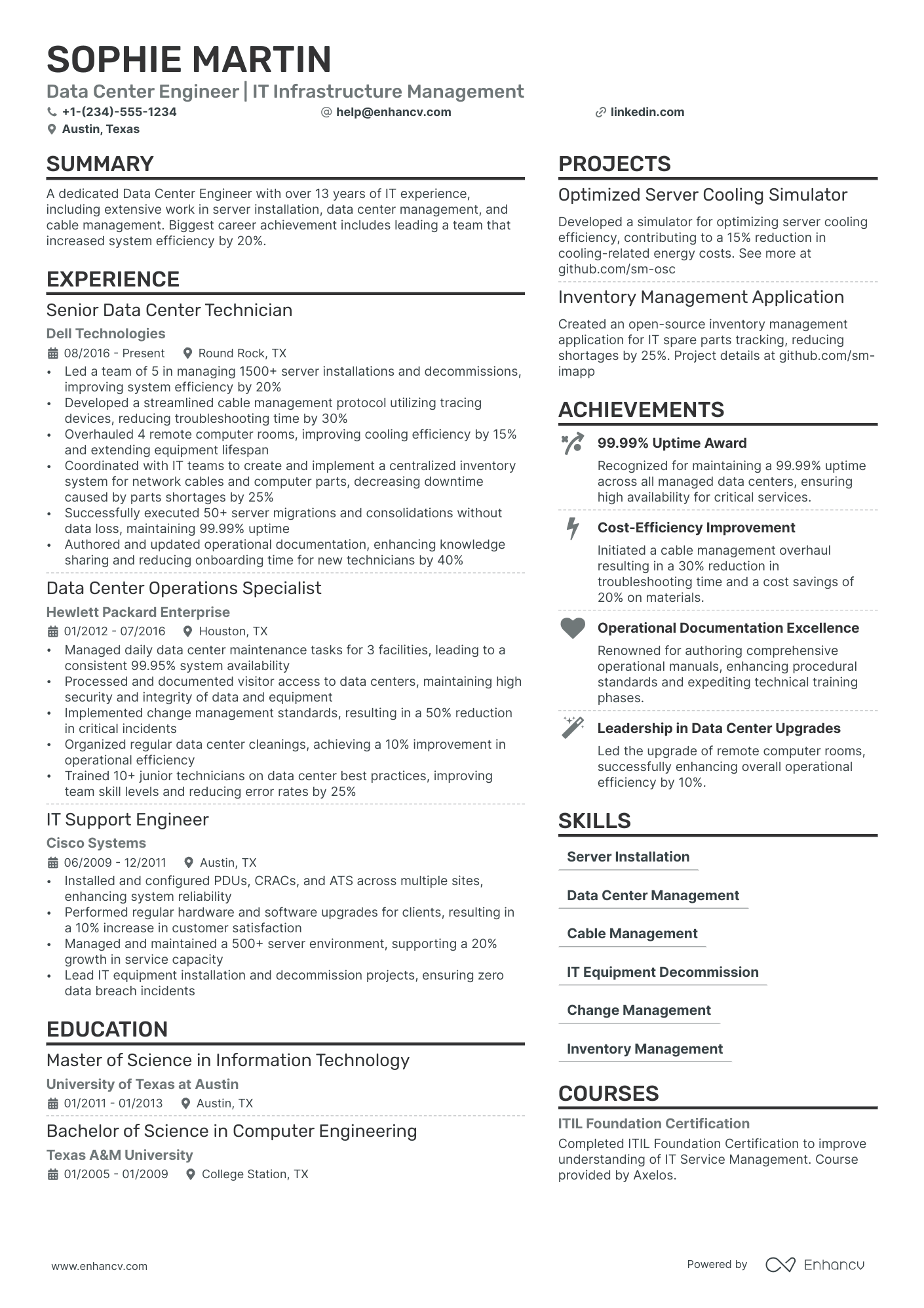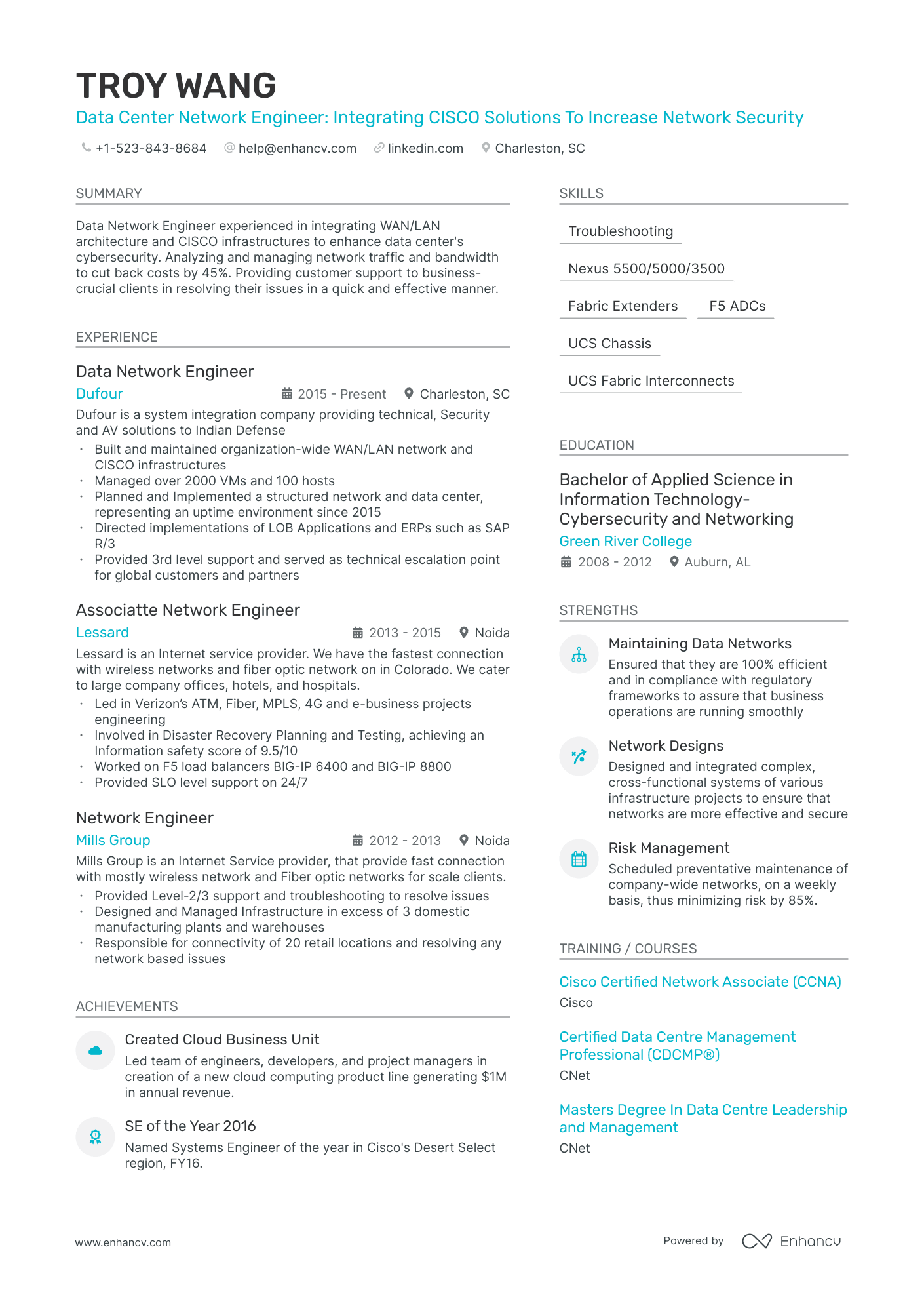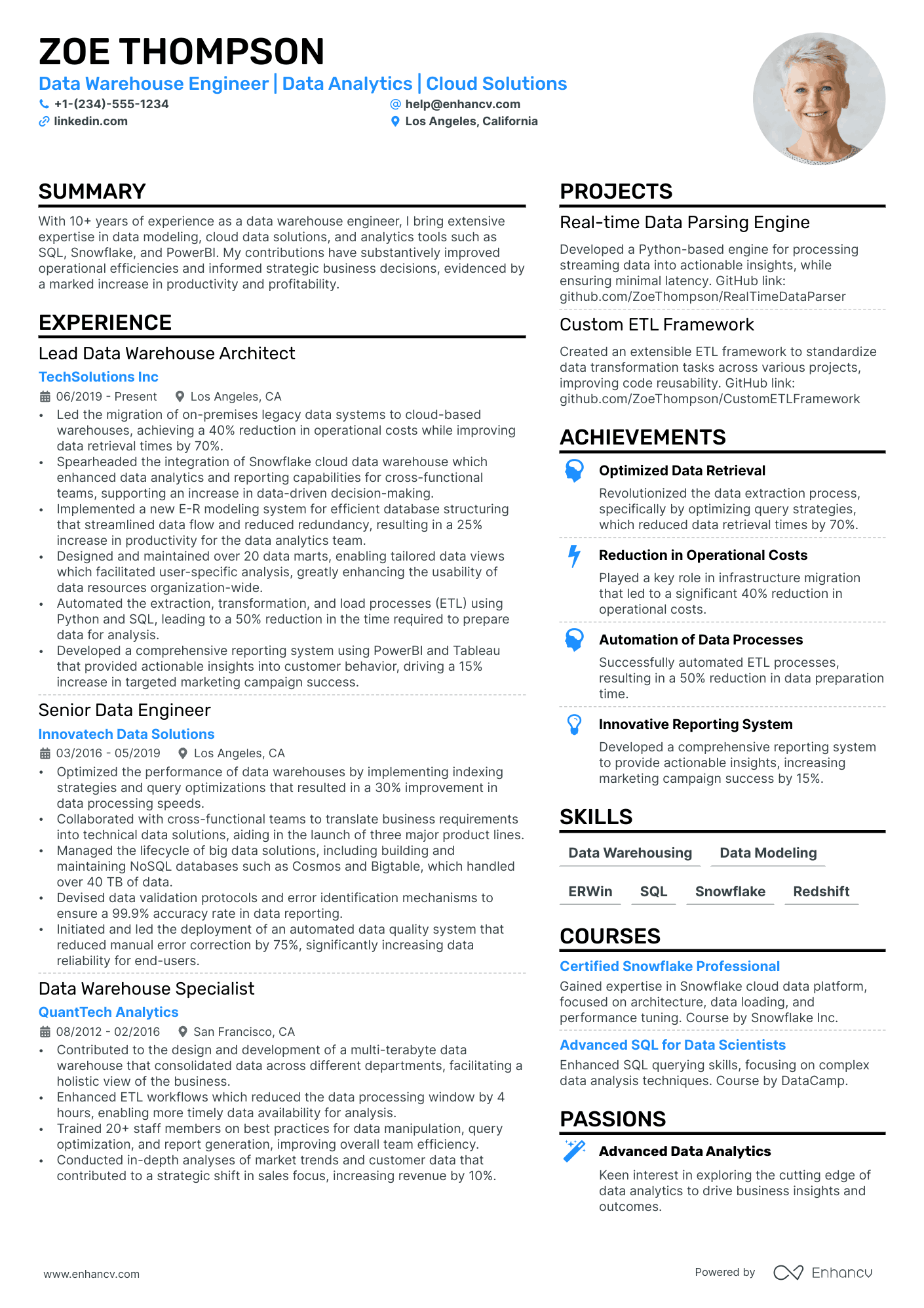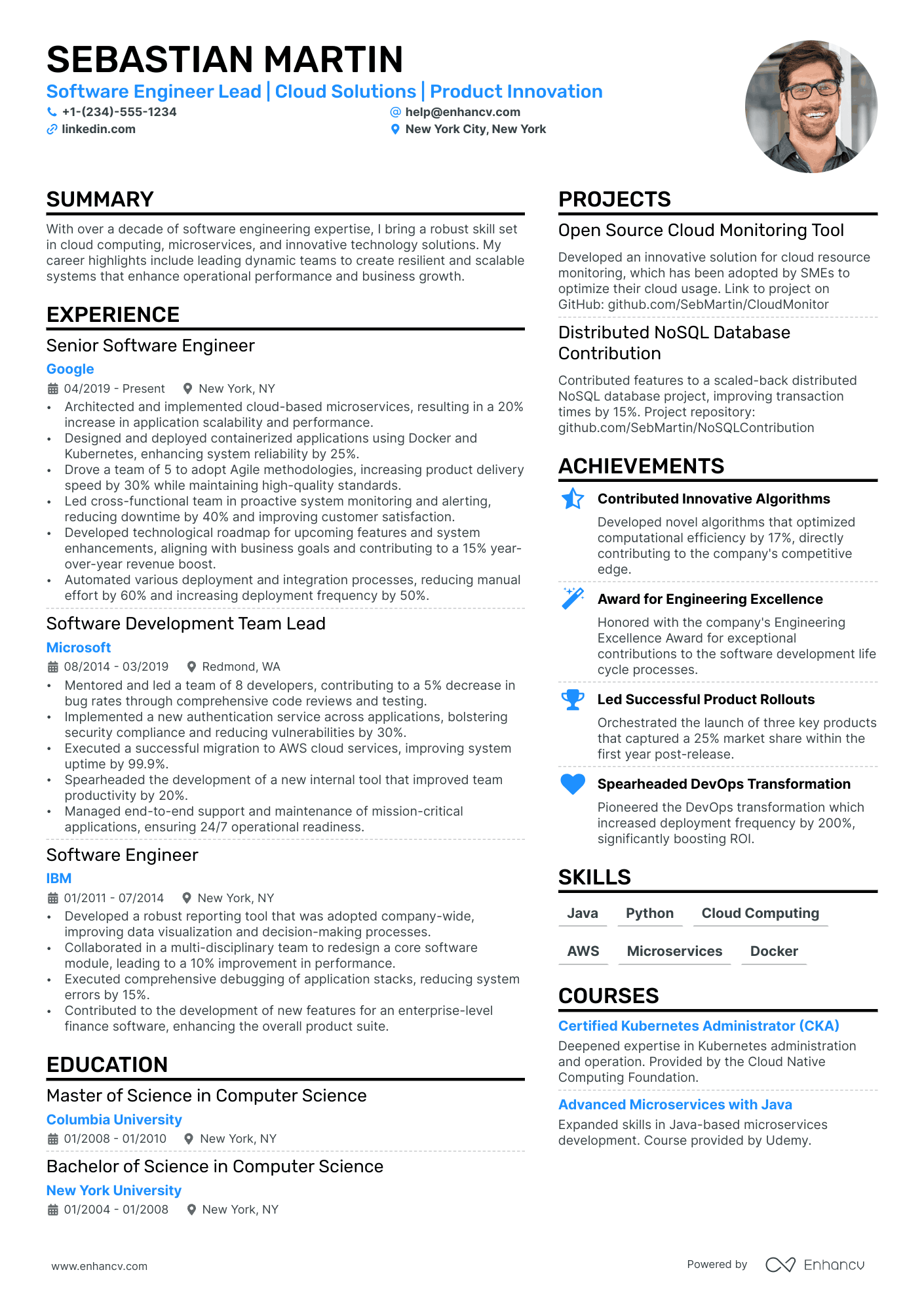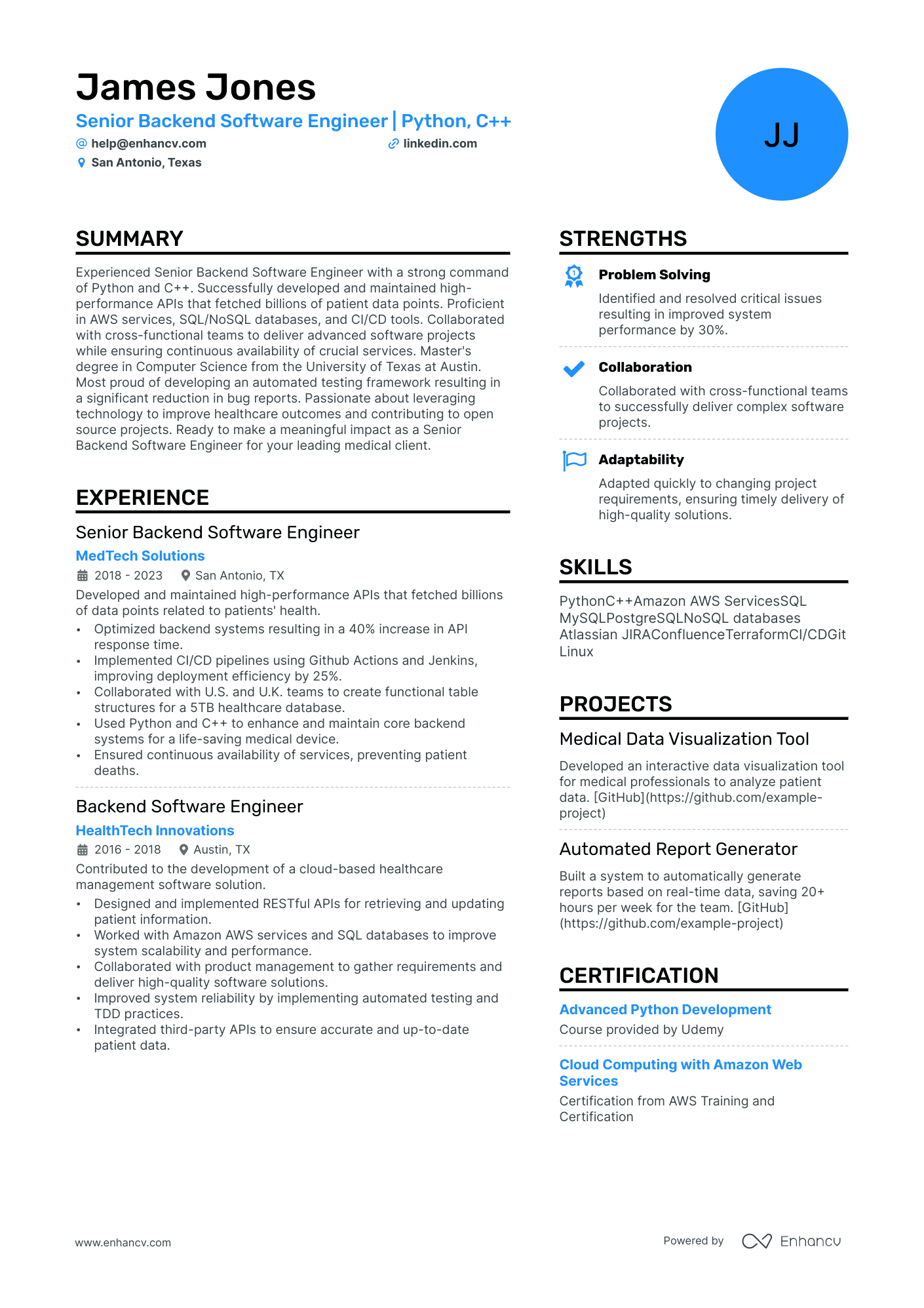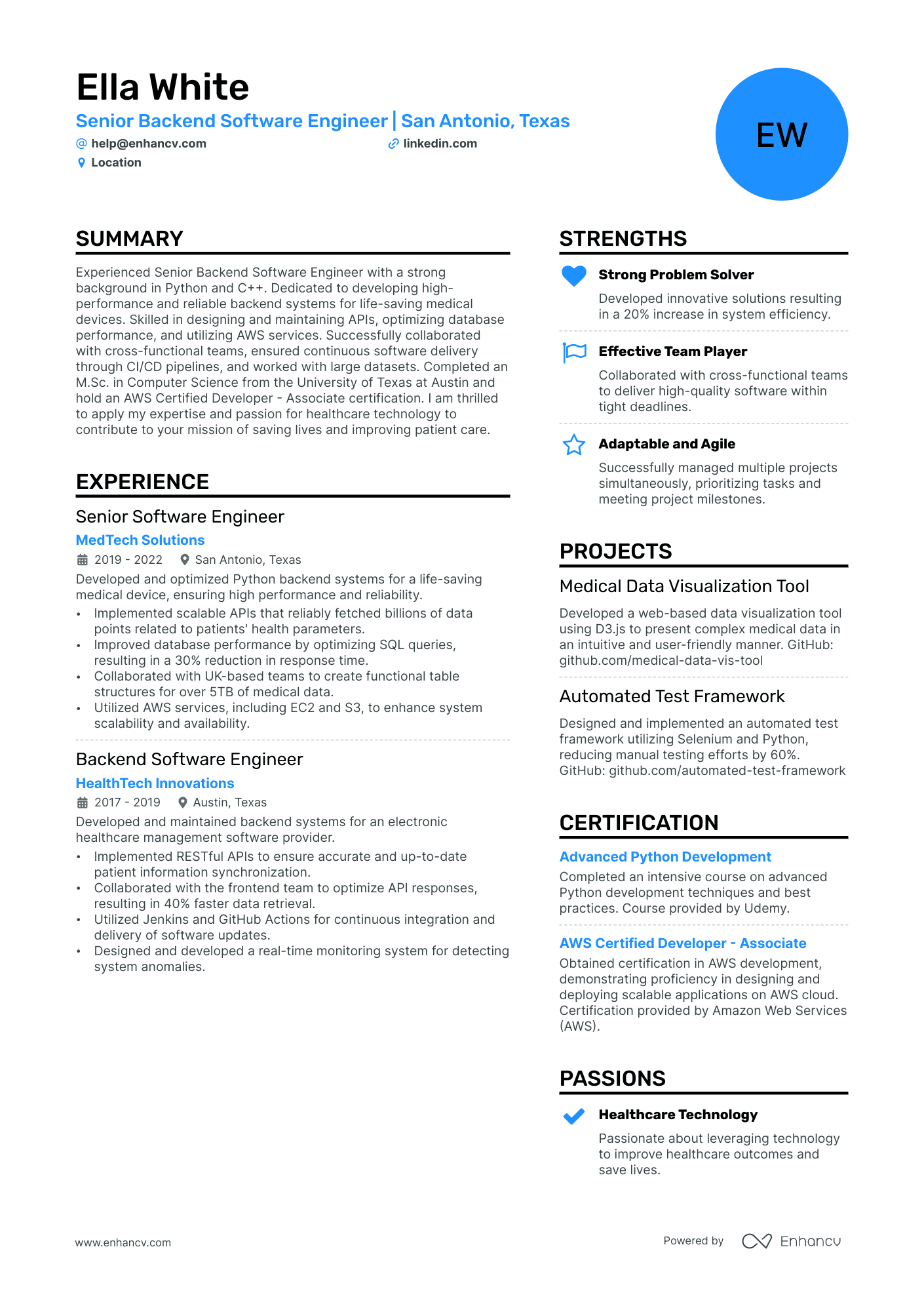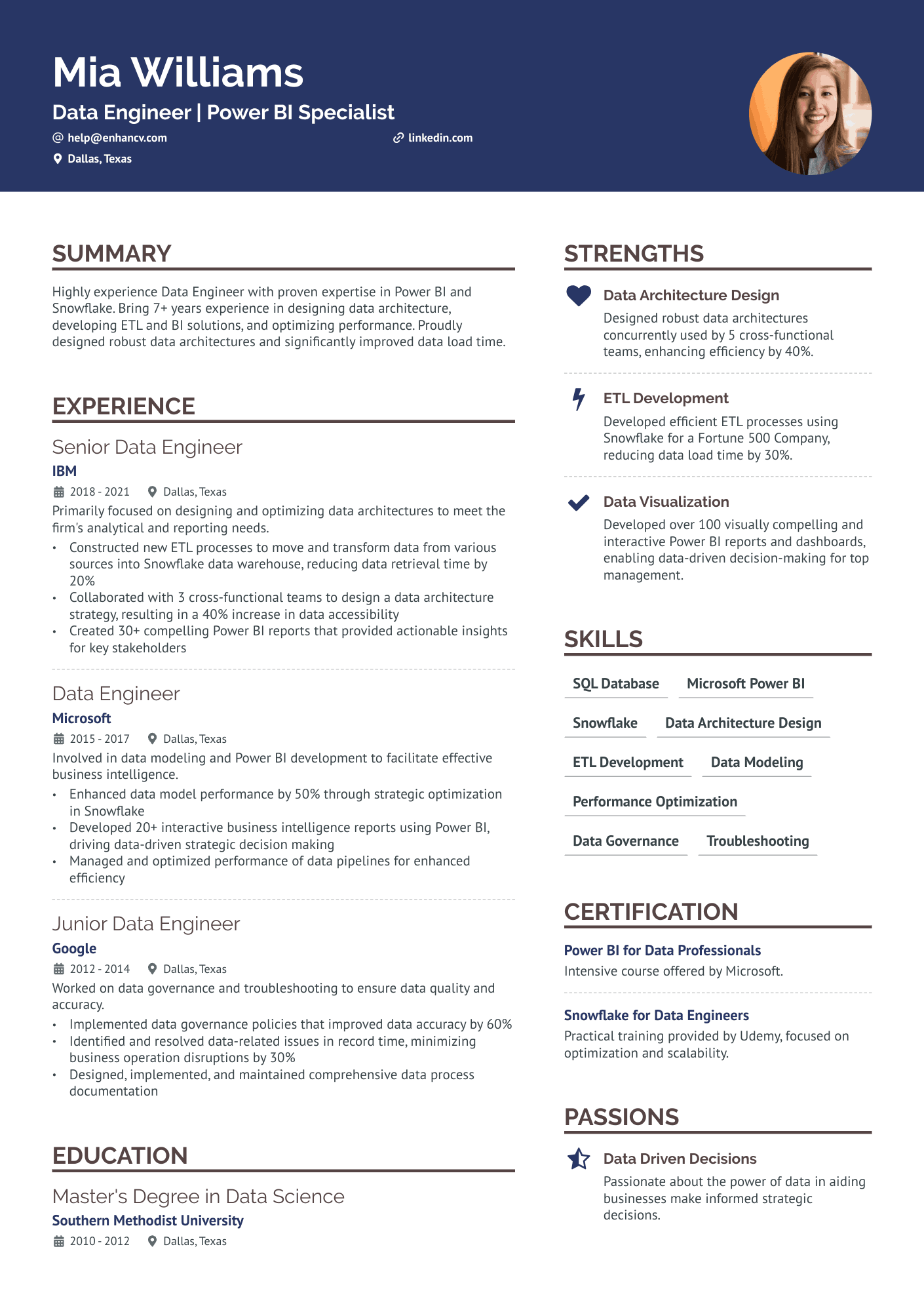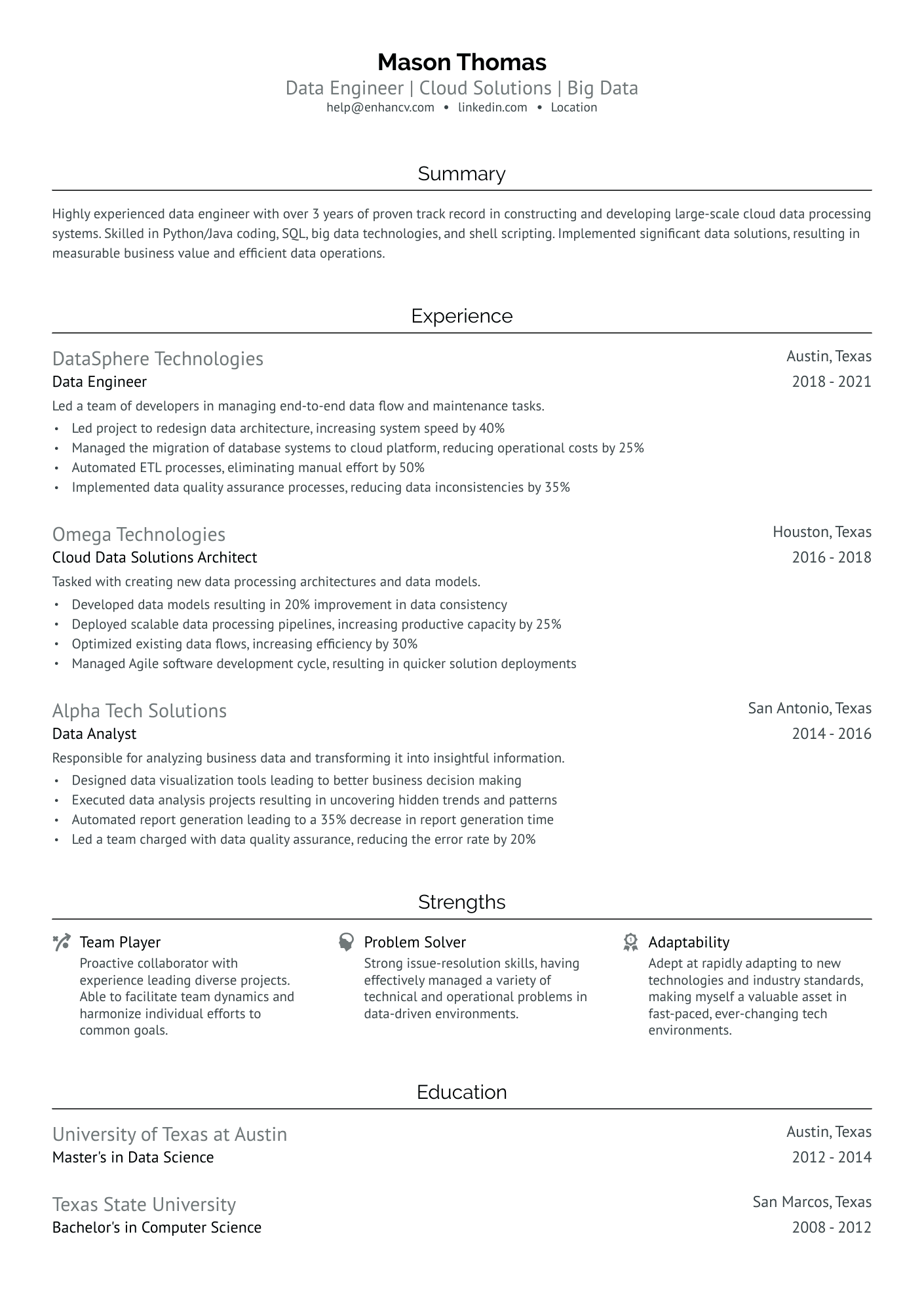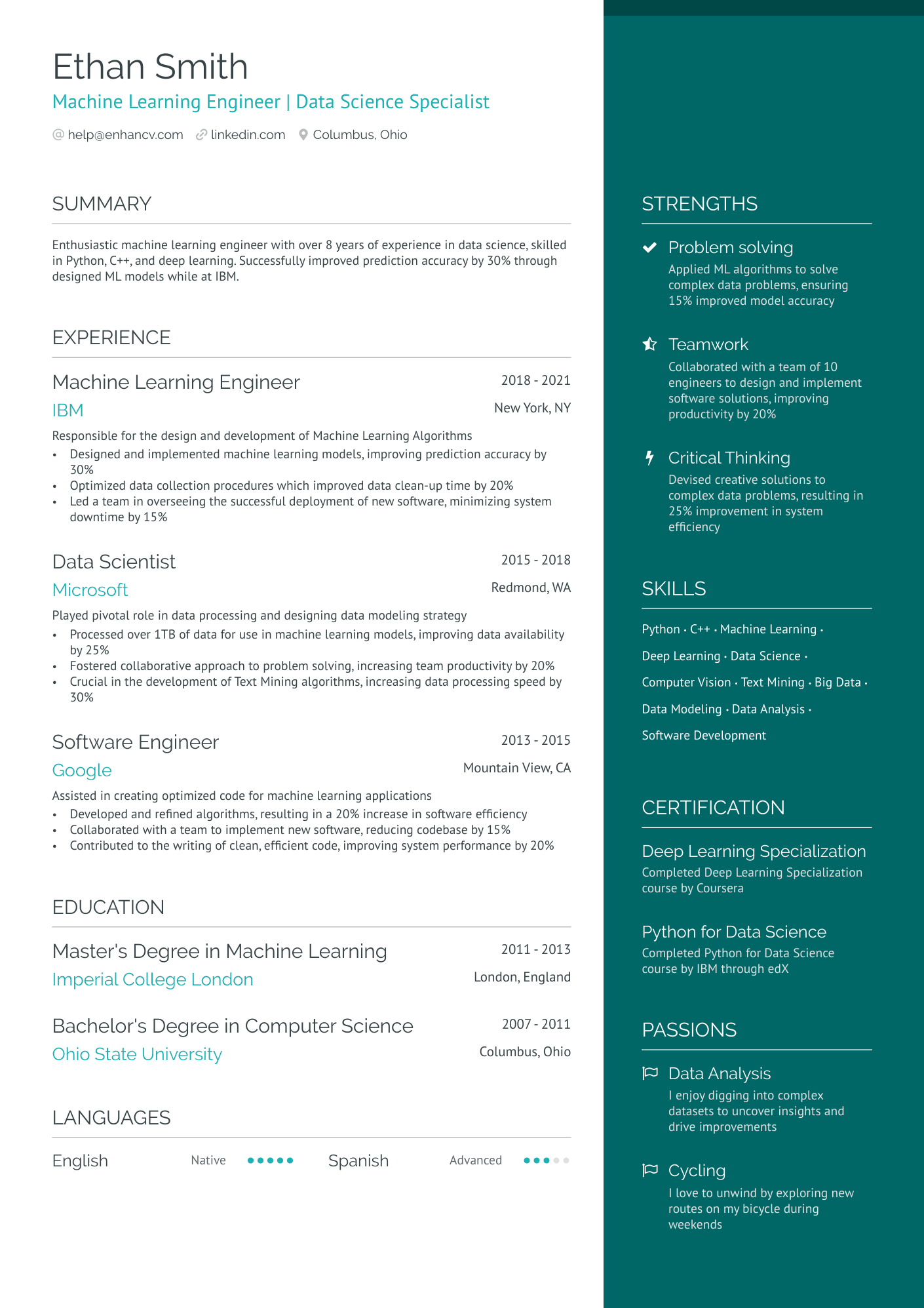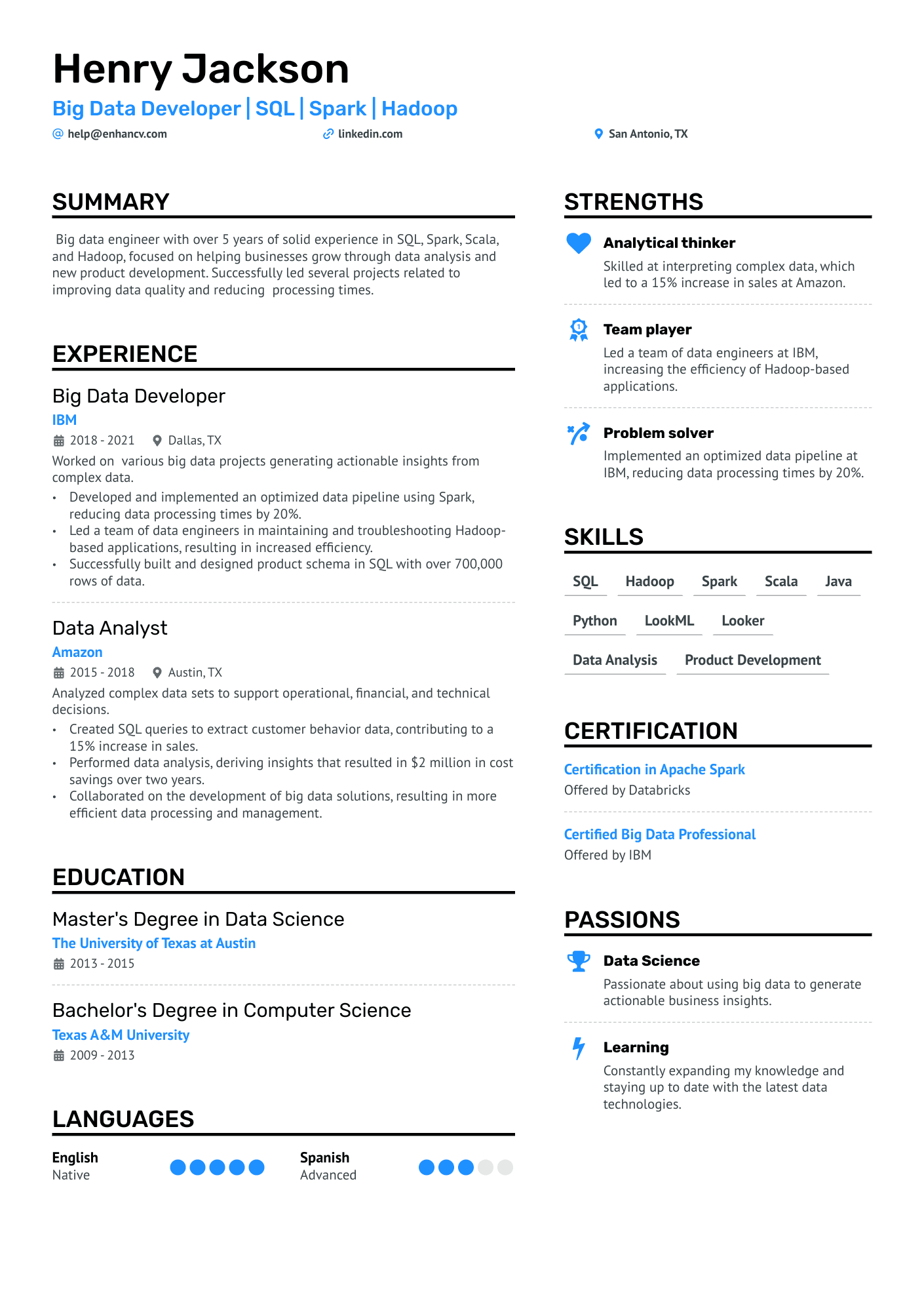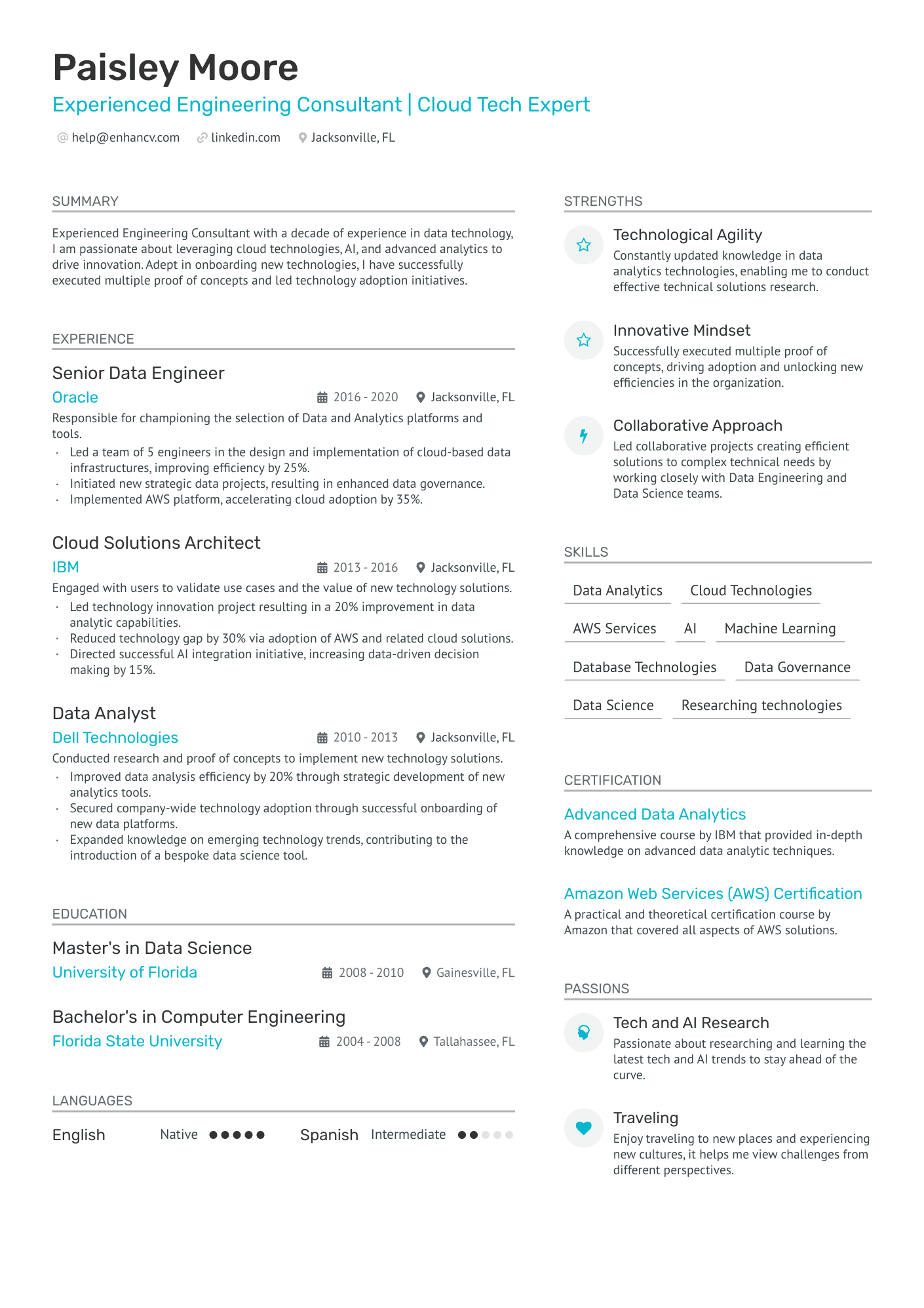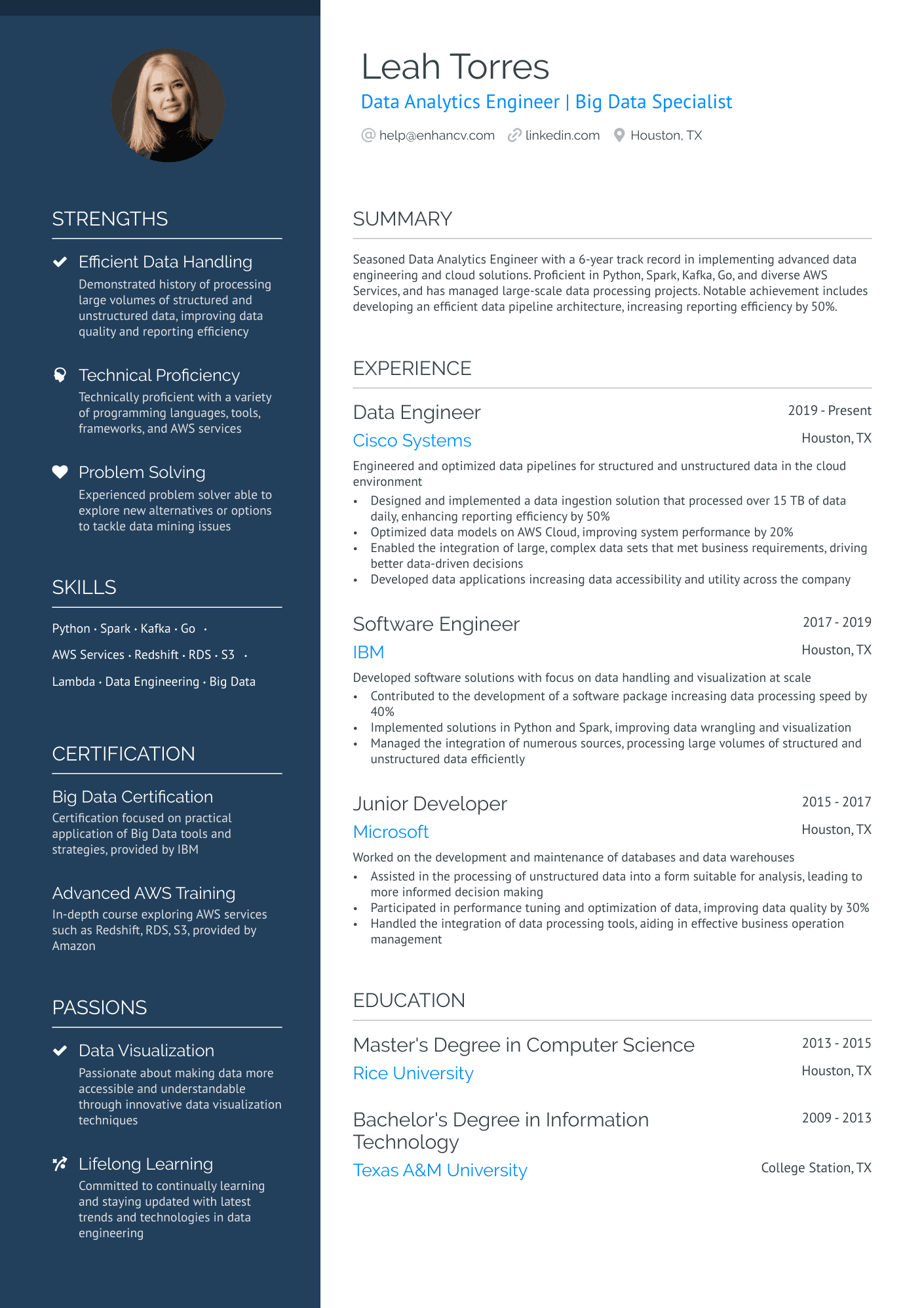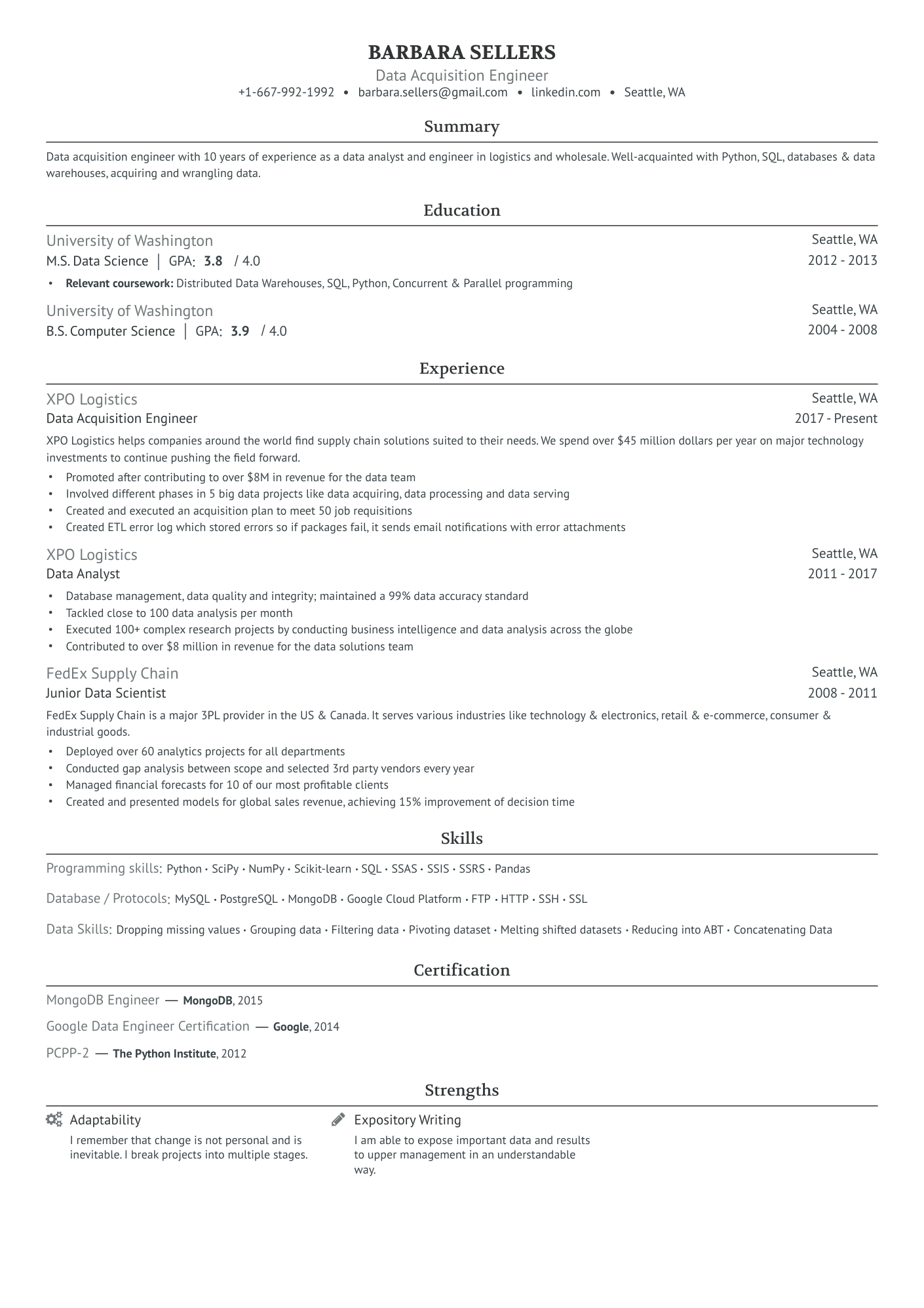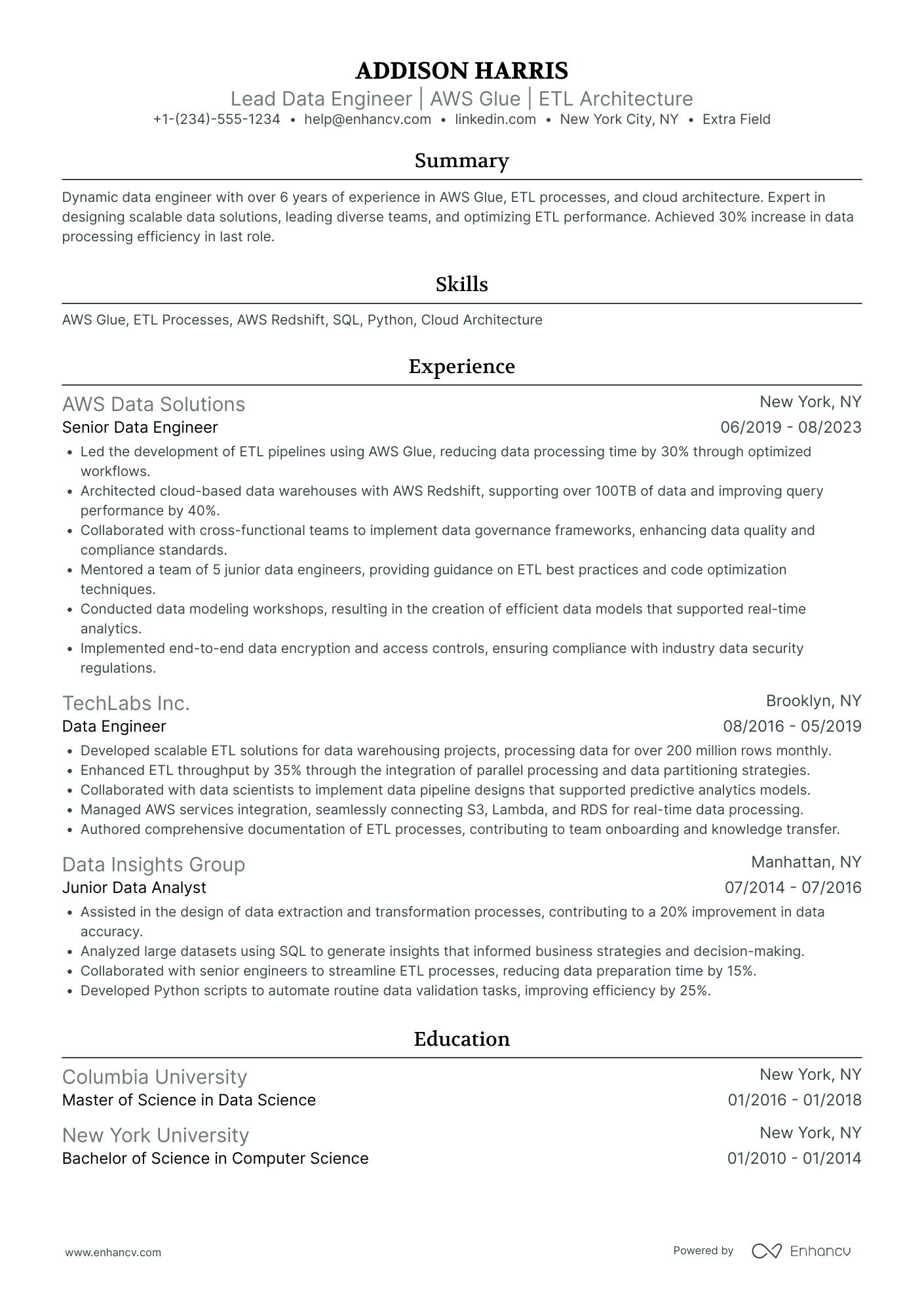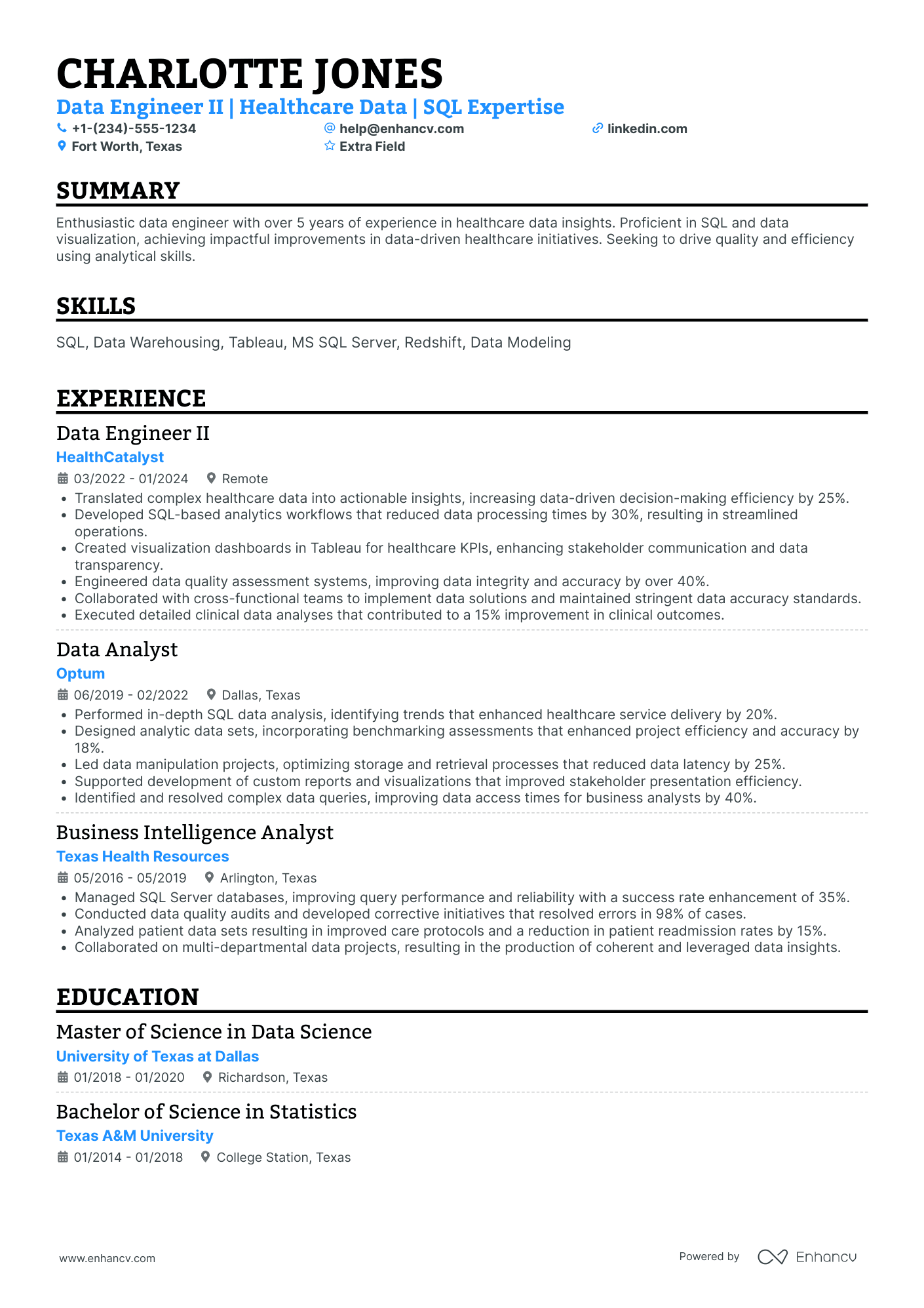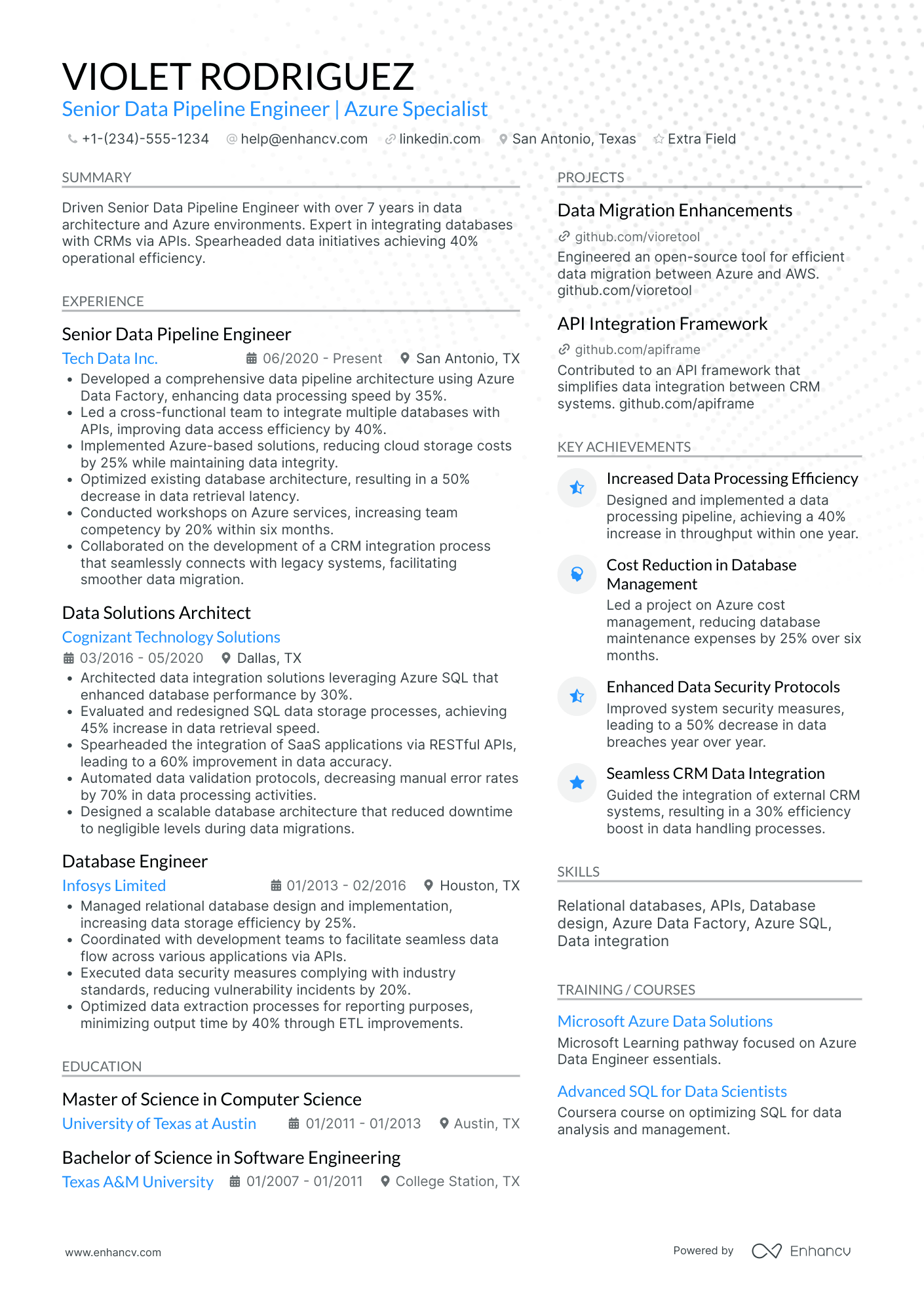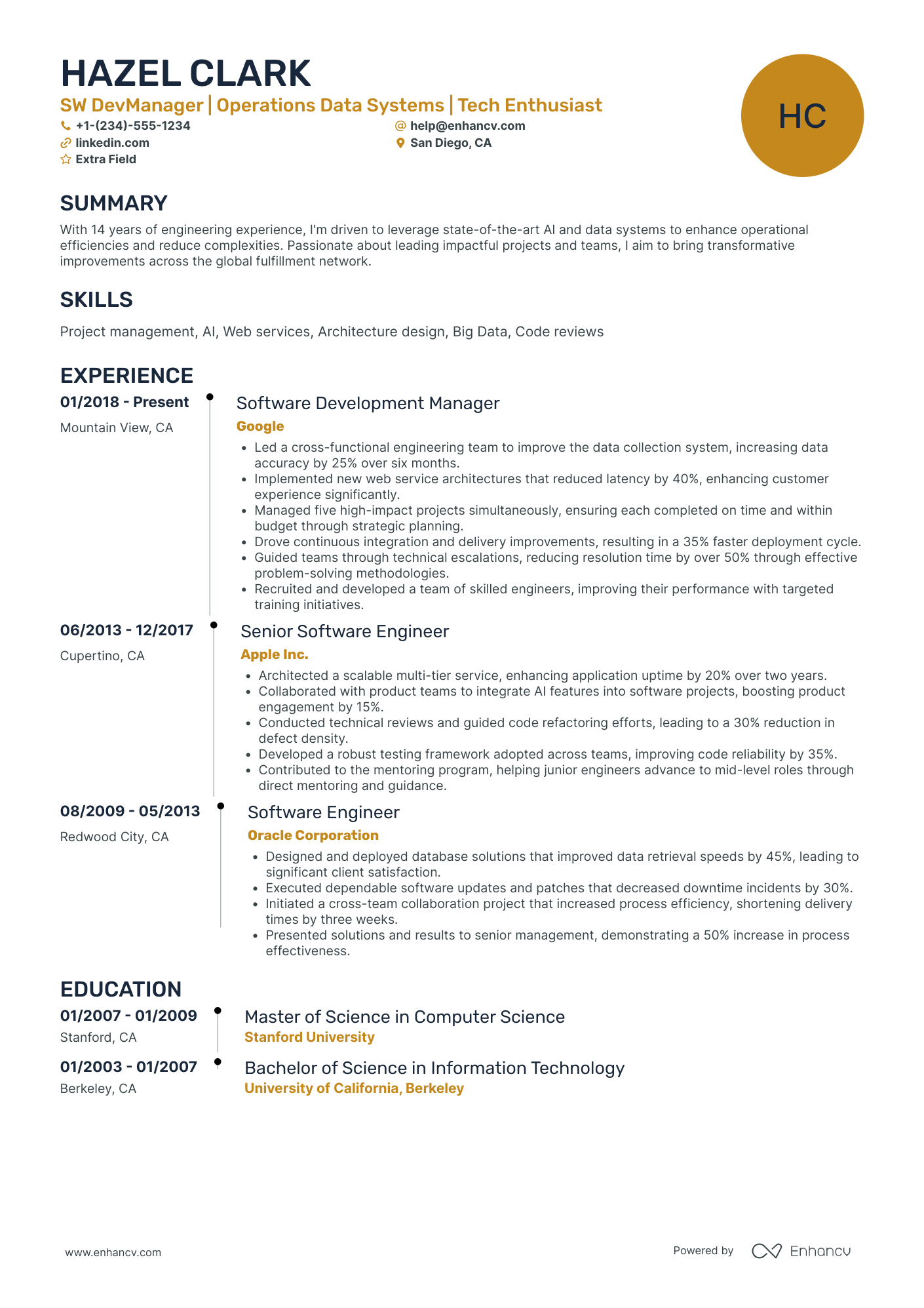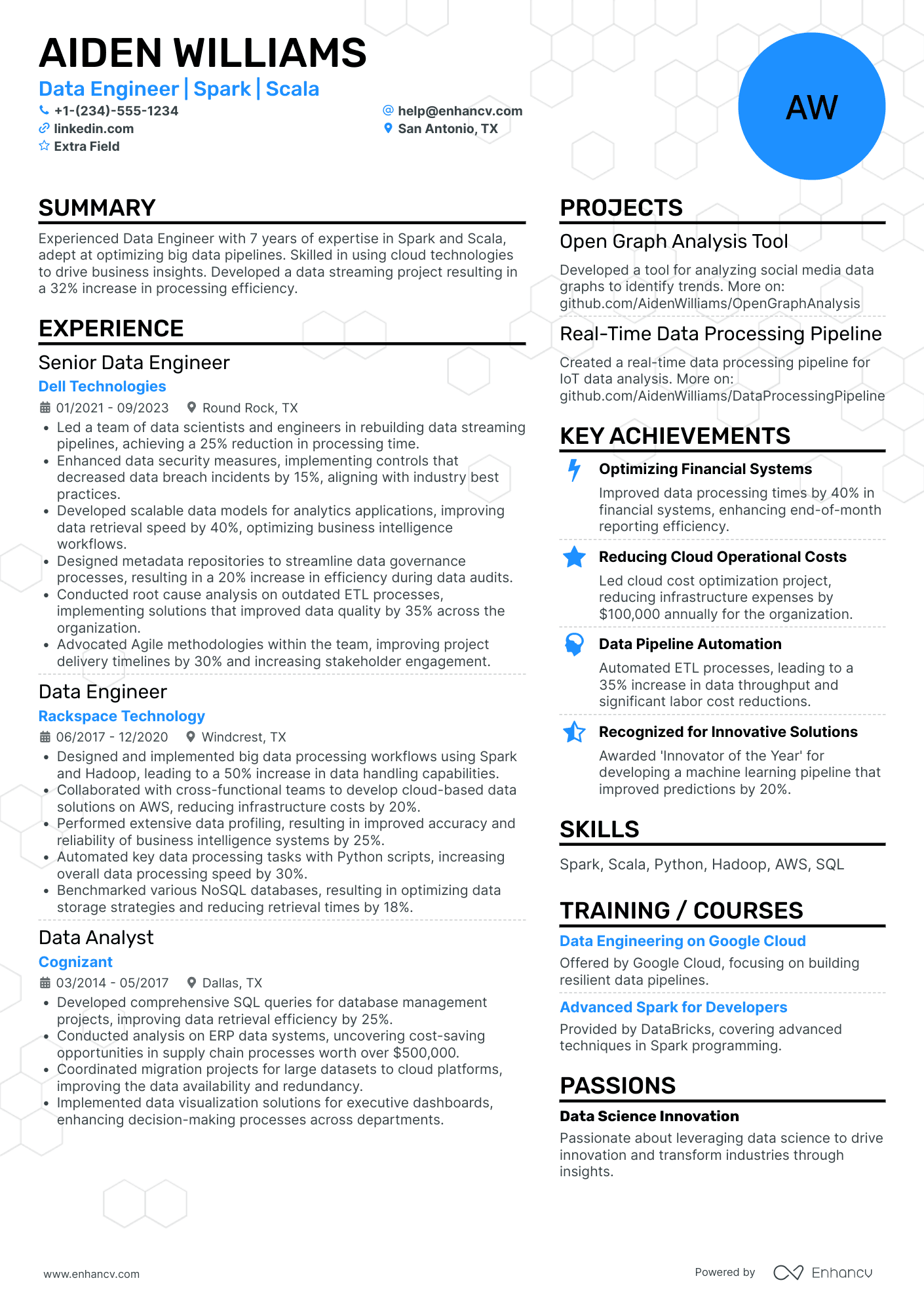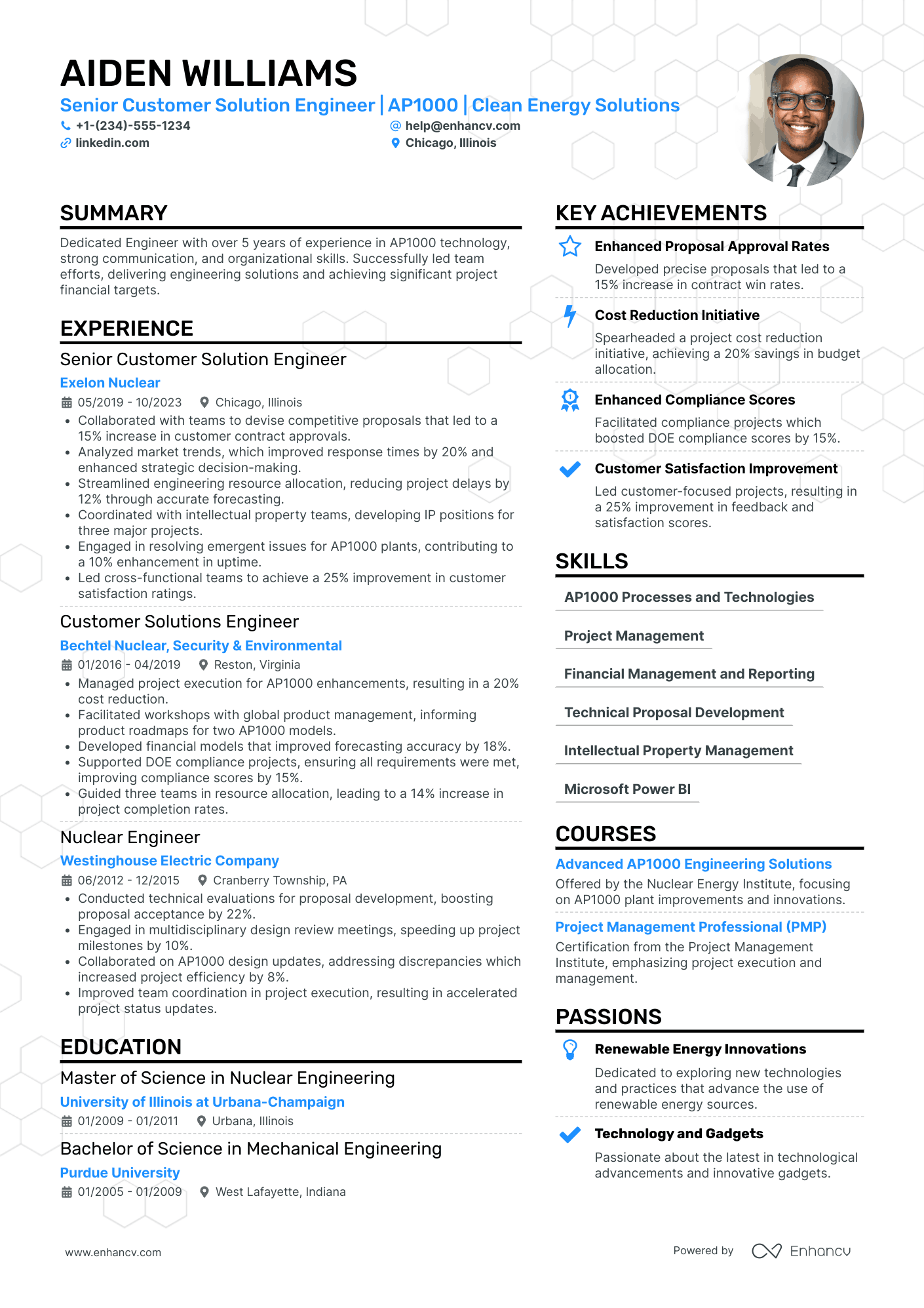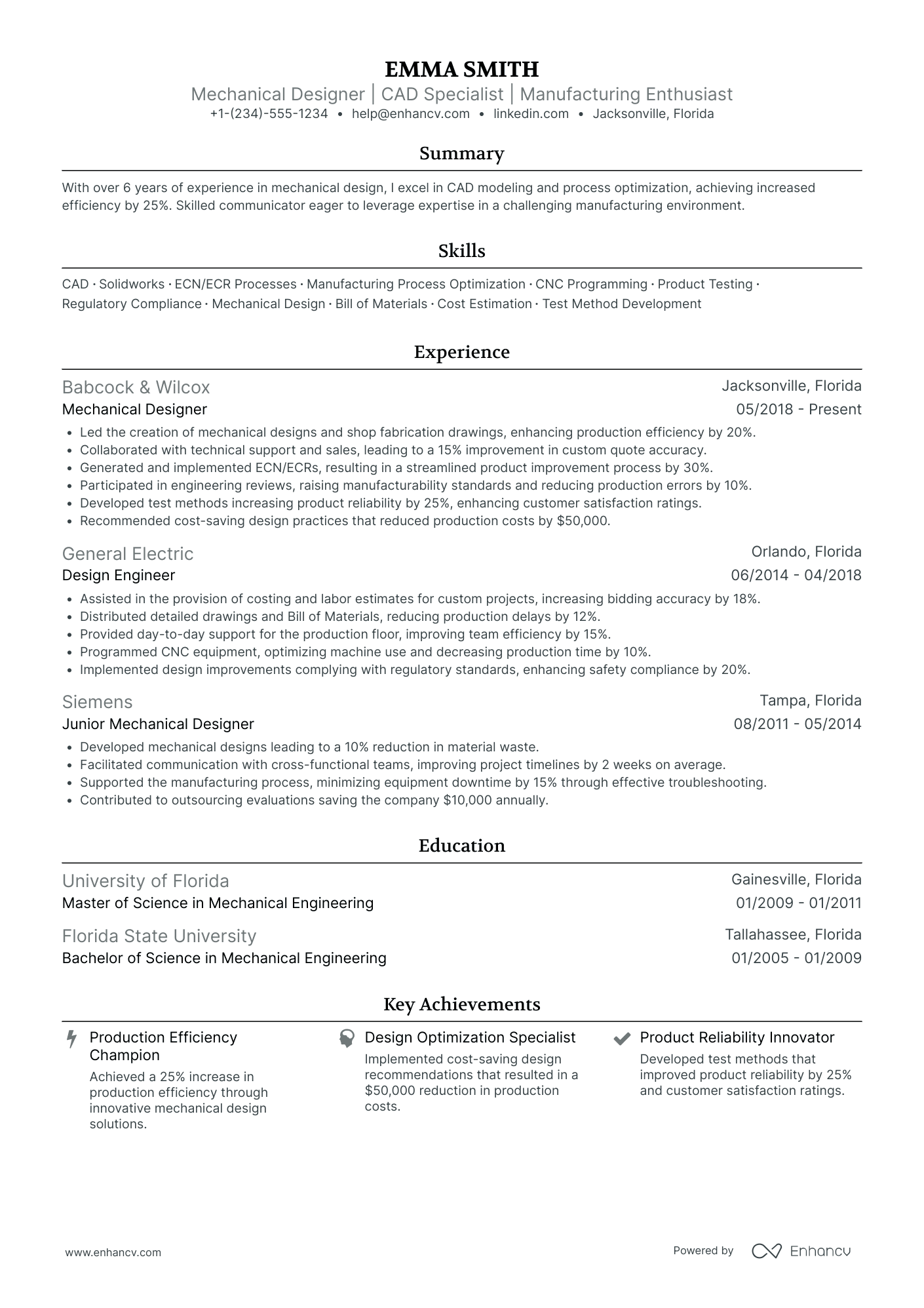Data engineers are the backbone of modern business operations.
You play a pivotal role in transforming raw data into actionable insights. You design and maintain robust data pipelines, ensuring data integrity and accessibility. And businesses rely on you to make informed decisions.
But the thing is,
It's one thing to recognize your worth as a data engineer, but another to be able to communicate that to recruiters effectively. To bridge this gap, you need to craft a data engineering resume that showcases your skills and achievements in the best light.
That's why we created this guide to teach you the following:
- A step-by-step process to build a data engineer resume from scratch
- HR-approved tips and unique tricks for writing each section
- Real-world templates and top-notch data engineer resume examples to inspire you in your writing journey
Data Engineer resume examples
By Experience
Entry-Level Data Engineer
Mid-Level Data Engineer
Senior Data Engineer
Senior Business Intelligence Data Engineer
Junior Data Engineer
By Role
Azure Data Engineer
Big Data Engineer
Data Center Engineer
Data Center Network Engineer
Data Warehouse Engineer
GCP Data Engineer
Lead Data Engineer
AWS Data Engineer
Power & Performance Data Engineer
Data Engineer Analyst
Computer Vision Data Engineer
Remote Data Engineer
Data & Platform Engineer
Data Analytics Engineer
Data Acquisition Engineer
Real-time Data Engineer
Data Warehousing Engineer
Data Pipeline Engineer
Data Infrastructure Engineer
Cloud Data Engineer
Solutions Data Engineer
- Well-structured Presentation - The resume is meticulously organized, with clear sections that are easy to navigate. This clarity in presentation, combined with a concise summary and well-defined experience segments, ensures that all pertinent information is accessible and easy to comprehend, catering to both in-depth and quick-scan reading preferences.
- Significant Career Progression - Aiden Williams’ career trajectory reflects a notable growth from a Nuclear Engineer to a Senior Customer Solution Engineer. The progression demonstrates substantial advancement in responsibilities, underscoring his capabilities to take on leadership roles and manage complex engineering projects, indicative of his professional development within the clean energy solutions sector.
- Technical Expertise in Nuclear Energy - The resume highlights in-depth technical knowledge specific to the nuclear energy industry, particularly with AP1000 technologies. It includes unique methodologies and tools like technical proposal development and intellectual property management, providing a comprehensive understanding of industry-specific challenges and solutions.
ETL Data Engineer
- Clear and Structured Content Presentation - The resume is well-organized, with distinct sections for experience, education, skills, and achievements. Each section is concise yet sufficiently detailed, making it easy to follow and understand the candidate's qualifications.
- Comprehensive Career Trajectory - Emma's career path demonstrates consistent growth and increased responsibilities, as seen in her transition from Junior Mechanical Designer at Siemens to a Mechanical Designer at Babcock & Wilcox. This upward movement highlights her dedication and capability to tackle more complex challenges over time.
- Industry-Specific Methodologies and Tools - Emma's proficiency in tools like Solidworks and CNC programming, alongside her process optimization skills, showcases her technical depth and alignment with industry standards. Her expertise in ECN/ECR processes and cost estimation further underscores her specialized knowledge within mechanical design and manufacturing.
How to format a data engineer resume
An organized database makes it easier for engineers to retrieve data efficiently. Similarly, a well-structured resume ensures that recruiters can quickly identify your key qualifications and achievements. Presenting yourself through a modern, elegant data engineer resume is an excellent way to set yourself apart and stand out.
Here are some essential formatting guidelines for a data engineer resume:
- Use a reverse chronological format: Start with your most recent job position and then list earlier roles in reverse chronological order. This approach gives recruiters insight into your level of expertise and career trajectory — especially when presenting your work experience in a data-driven manner.
- Create an eye-catching resume header: At the top of the resume, include a header section that displays your name and job position, followed by your contact information: email address, phone number, and LinkedIn profile.
- Organize your resume into multiple sections: Segment your resume into distinct sections, each highlighting a specific aspect of your professional journey. This should include primary sections like "Experience" or "Skills" and additional sections such as "Projects" and "Achievements."
- Choose an ideal resume length: If you have less than a decade of experience as a data engineer, a one-page resume is ideal to convey your value succinctly. However, extending your resume to two pages may be appropriate for anyone with extensive experience.
Be mindful of regional differences in resume formats – a Canadian layout, for instance, might vary.
Pro tip
A common question data engineers pose when crafting their resumes is: "Which file format (PDF, DOCX, HTML, JPG) should I use for my resume?" In short, it's best to opt for a PDF format. This ensures your resume's structure remains consistent across various devices and platforms. As a consequence, you’ll guarantee that the hiring manager views your resume precisely as you designed it.
Is your resume good enough?
Drop your resume here or choose a file. PDF & DOCX only. Max 2MB file size.
The top sections on a data engineer resume:
- Resume header: Introduces you by displaying your name, title, and primary contact details.
- Resume summary: Summarizes your expertise and background in data engineering.
- Resume experience: Details your past roles, data projects, and their impact.
- Technical skills: Lists the data tools, platforms, and languages you've mastered.
- Certifications: Highlights data-related credentials and courses you've completed.
- Achievements: Spotlights impactful data solutions and projects you've spearheaded.
What recruiters want to see on your resume:
- Expertise working closely with data scientists, analysts, and other departments to achieve company goals.
- Demonstrated ability to tackle complex data challenges and devise solutions.
- Mastery of key tools, cloud databases, and platforms like Hadoop, Spark, and SQL.
- Soft skills such as teamwork, communication, and adaptability — which are crucial in collaborative environments.
- Bachelor's or master's degree, typically in Computer Science, Data Science, or any related discipline.
For more inspiration, here are more attractive resume templates to accelerate your job search.
How to write your data engineer resume experience
Think of the experience section as a data model representing your professional journey and the interconnections of your career roles.
It's where you detail the roles you've held, the duties you managed, and the impact you had on each company you worked for.
As a data engineer, there are many responsibilities and key skills to show in your resume. However, hiring managers are particularly looking for evidence of proficiency in data management, pipeline construction, and cloud platform expertise.
So how do you create a compelling experience section for your data engineer resume?
- List job-specific duties: Your resume should reflect duties specific to the data engineering role you're applying for. It must be aligned both with the job description and the current market demands in the data engineering field.
- Demonstrate impact with numbers: To validate claims about your expertise, it's crucial to feature metrics with each achievement you list. Showcasing tech stack is also an efficient way to provide a clearer picture of your hands-on experience.
- Use action verbs: Begin each bullet point in your experience section with a strong action verb. This helps you make your data engineering resume more dynamic and emphasize your proactive role in past positions.
Let's review two examples of the experience section on a data engineering resume:
- •Responsible for troubleshooting various computer issues and implementing solutions for Novotel.
- •Monitoring and troubleshooting issues with java code.
- •Machine learning program research.
- •Manage configuration changes to various product devices.
- •Installed and managed various python projects.
Unfortunately, this first example falls short in many aspects and is unlikely to land you a job — even at a local small business. It’s full of generic duties that don’t emphasize results nor show the candidate’s worth.
To improve it, the applicant must do the following:
- Incorporate job-specific duties: Tailor your experience to align closely with the specific responsibilities of each data engineering role based on the job description.
- Integrate quantifiable metrics: Numbers provide context and scale, making achievements more tangible and impactful.
- Utilize strong power words and action verbs: These will not only make your resume more dynamic but also convey a proactive attitude.
Having made these improvements, let's delve into a more refined and effective example:
- •Built Streaming services for real time processing of 100,000 users using Java and Scala
- •Improvement performance of existing ETL processes and SQL queries for weekly CRM summary data
- •Lead migration of a legacy Data Warehouse from On-premise to AWS and Java/Spark
- •Developed infrastructure to process 15 TB/day resulting into 8% increase in online sales of Ad-tech division
How to quantify impact on your resume
In your profession, you've learned that data can give depth and significance to any statement, claim, or conclusion. The same principle applies when building your data engineering resume. Measurable impact is the best way to showcase your contributions and value to potential employers.
Here's a list of quantifiable data engineering responsibilities with examples to feature on your resume:
- Data processing: Reduced data processing time by 18% by optimizing algorithms.
- Pipeline construction: Designed and implemented 15+ data pipelines, improving data flow efficiency by 27%.
- Database management: Managed and maintained a database of over 1.5 million records with 99.9% uptime.
- Data cleansing: Enhanced data quality by implementing automated cleansing procedures, reducing errors by 22%.
- Cloud integration: Migrated 3+ terabytes of data to cloud platforms, resulting in a 33% reduction in infrastructure costs.
- Query optimization: Improved query response time by 32% through performance tuning.
- Data modeling: Developed 12+ data models that supported business decision-making and increased revenue by 17%.
- ETL processes: Automated ETL processes, leading to a 47% reduction in manual data handling tasks.
- Collaboration: Collaborated with cross-functional teams on 5 major projects, leading to a 16% increase in project delivery speed.
- Training: Conducted 7 workshops on best data practices, enhancing team productivity by 25%.
How do I write a data engineer resume with no experience
The demand for data engineers continues to surge as more companies are recognizing the value of data-driven insights in decision-making. However, breaking into well-established firms or securing high-paying roles can be tough when you don't have experience.
The good news is that with the abundance of jobs, many startups and small businesses are open to hiring entry-level applicants as long as they have the right profile.
So how do you land a job successfully even if you lack experience?
- Instead of a resume summary, feature an objective at the top of your resume to clearly state your career goals and aspirations.
- Prioritize your educational background, especially courses and projects that align with data engineering concepts and tools.
- Showcase relevant data engineering certifications to demonstrate your commitment to the field.
- Spotlight soft skills and transferable talents, to make up for your lack of practical experience.
- Include additional sections such as workshops and online courses to further bolster your application.
How to list your hard skills and soft skills on your resume
Resume skills are a great way to demonstrate how you can add value and support informed business decision-making. Your skills also show that you've bridged the gap between academic qualifications and real-world application.
Before we get into more details on how to best list skills on your resume, let's first understand what soft/core skills are and how they differ.
- Soft skills: are the interpersonal traits that determine how you interact with colleagues and approach challenges. For data engineers, important soft skills include communication, teamwork, and problem-solving.
- Hard skills: are the core and technical abilities you've acquired through education, training, and work experience. In your case, this could include proficiency in programming languages and data analysis tools.
How to list skills on a data-engineer resume in a few steps:
- Categorize your personal skills: Separate all your talents and attributes into two main categories: hard skills and soft skills.
- Prioritize relevant skills first: Start with the most relevant talents based on the job description. For example, if the hiring company is looking for “Python Programming” skills, feature that first under hard skills.
- Use specific keywords to bypass ATS systems: For example, instead of just "database management," specify which databases you're proficient in, like "MySQL" or "MongoDB."
- Highlight transferable skills: Even if you're switching industries, certain abilities like "effective communication" or "team collaboration" are universally valued.
- Keep your list to 10-15 skills at most: It's tempting to list all your skills at once, but a cluttered skills section isn't as impactful. Featuring 10 to 15 soft and core skills is ideal for all data engineer resumes.
It's always a good idea to give it some time before you submit your resume — so you can look at it with fresh eyes again. If you have any data engineering colleagues or mentors, ask them to review your skills section for relevance and clarity.
Best hard skills for your data engineer resume
- SQL
- Python
- Big Data Technologies (Hadoop, Spark, Kafka)
- Relational Databases (PostgreSQL, MySQL)
- NoSQL Databases (MongoDB, Cassandra)
- ETL Processes
- Cloud Platforms (AWS, GCP, Azure)
- Cloud Databases (Snowflake, Azure SQL, Databricks)
- Data Warehousing Solutions (Redshift, BigQuery)
- Data Modeling & Design
- Stream Processing (Kafka Streams, Flink)
- Workflow Orchestration (Apache Airflow, Prefect)
- Data Storage Solutions (AWS S3, Delta Lake)
- Data Integration Tools (Talend, Informatica)
- Distributed Systems & Architecture
- Performance Optimization & Tuning
- Data Governance & Compliance
- Containerization (Docker, Kubernetes)
- Machine Learning Integration & Pipelines
- API Development & Management
Best soft skills for your data engineer resume
- Communication
- Teamwork
- Problem-Solving
- Adaptability
- Critical Thinking
- Time Management
- Attention to Detail
- Decision-Making
- Empathy
- Patience
- Flexibility
- Strategic Thinking
- Active Listening
- Conflict Resolution
- Leadership
- Creativity
- Resilience
- Fast Learner
- Continuous Learning
- Cross-functional Collaboration
How to list your certifications and education on your resume
In a highly competitive field such as data engineering, certifications are essential for validating your expertise and proving to potential employers that you’re fully committed to the profession.
Of course, for that to be effective, you should only list certifications that are relevant to the job you're applying for.
Best certifications for your data engineer resume
- AWS data engineer Certification;
- Google data engineer Certification;
- IBM Certified Solution Architect;
- CCP data engineer;
- Certification of Professional Achievement in Data Sciences;
- Certified Analytics Professional;
- Cloudera Certifications;
- MongoDB Certified Engineer;
- MapR Certifications;
- Azure data engineer Associate (Microsoft Certification).
What about your educational degree?
Education is what lays the groundwork for your career. Companies frequently require specific degrees to ensure candidates have a foundational understanding of the field and the necessary skills to contribute from day one.
Here’s a quick example of how to list education on a data engineer resume:
How to write your data engineer resume summary or objective
A lot of data engineering job seekers add a summary or objective at the top of their resumes. While both statements offer a brief snapshot of your professional journey, the two sections serve different purposes.
A resume summary is a concise overview of your work achievements, skills, and experience. Summaries are best suited for applicants who have a significant amount of experience as data engineers.
A resume objective, on the other hand, is a short statement about your career goals and aspirations. It communicates to hiring managers what you aim to achieve in your next job and how you intend to accomplish it. Objectives are an ideal option for entry-level candidates or applicants in the middle of a career transition.
Examples of data engineer resume summaries:
There’s a lot to improve in the previous example. Not only is it vague and generic, but it also doesn’t highlight any measurable achievements to awe recruiters.
Here’s how you can improve that in three simple steps:
- Always quantify your achievements: Detail your experience with numbers and data to make your claims more impactful.
- Highlight your value clearly to the recruiter: Focus on how your skills and talents were beneficial to past employers. This is an excellent way to showcase direct contributions and influence in the workplace.
- Utilize ATS keywords: Read the job description carefully to identify all the keywords the hiring company wants you to use. Those can be achievements, skills such as “Python and SQL,” and degrees such as “Master’s in Data Science.”
Let’s make those changes and see the result:
Additional sections for a data engineer resume
Additional sections can be a powerful way to distinguish yourself from the pack as a data engineer. While core qualifications are essential, these sections offer a more holistic view of your expertise and passions. Recruiters will appreciate every insight you can provide to help them hire you.
Here are the best sections you can add to a data engineer resume to stand out:
- Strengths: Similar to "Skills," this section highlights the core competencies and innate talents that make you a standout data engineer.
- Projects: Under "Projects," you can detail significant personal, academic, or professional assignments that showcase your hands-on experience in the field of data engineering.
- Workshops: Mention the workshops you've attended, facilitated, or presented to prove your commitment to continuous learning and staying up-to-date with industry trends.
- Courses: Courses play a pivotal role in your professional journey as a data engineer. Use this section to feature any specialized coursework you’ve undertaken outside of your formal education.
- Awards & Honors: Did you receive accolades or recognitions in the data engineering domain? List them here to emphasize your active contributions to the company's success.
How to feature projects on a data engineer resume
Featuring a projects section on your resume enables you to provide tangible evidence of your technical prowess and problem-solving abilities. This is an opportunity to showcase how you can apply your skills in real-world scenarios, which makes you a more compelling candidate to hire.
So how do you highlight successful data engineer projects on your resume?
- Emphasize relevance: Prioritize data projects that align closely with the job description and the company’s expectations.
- Illustrate complexity: Go with projects that tackle challenging data problems or require innovative solutions.
- Highlight skillset diversity: Feature a mix of projects that showcase a wide range of skills, such as data wrangling and machine learning implementations.
Key takeaways
- Prioritize modern resume design and formatting to enhance readability and swiftly capture the recruiter’s attention.
- Read carefully thorough job descriptions so you can tailor your data engineer resume to company needs.
- Structure your experience section in a reverse-chronological format — and make sure all your accomplishments are quantifiable.
- Emphasize soft skills and core talents to validate your expertise and impress recruiters.
- Spotlight your degree and relevant certifications to gain an edge when competing for highly demanding jobs.
- Expand your resume and make it more impactful by incorporating additional sections such as projects, courses, and awards.
